- TOEFL Writing Correction Topics
- OET Mock Tests
- Writing Correction
- Speaking Mock Test
- Reading Course
- Listening Practice Tests
- FREE Practice Tests
- OET Writing Correction
- OET Reading Course
- OET Speaking Mock Test
- TOEFL Writing Correction
- PTE Writing Correction
- OET Listening Practice Tests
- OET (Occupational English Test)
- PTE (Pearson Test of English)

IELTS Vocabulary – Travel
- Finance & Money
- Communication
- Climate Change
- Social Media
- Entertainment
- Transportation
- Environment
- Crime and Policing
- IELTS Vocab
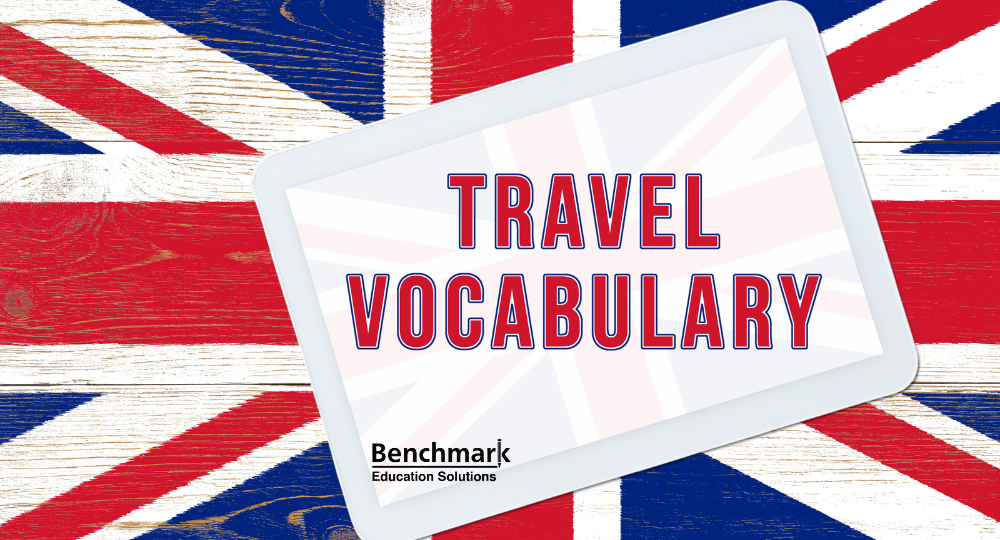
Questions about travel and tourist destinations are extremely common on the IELTS examination. This page contains essential words and phrases that will help you answer questions on the topic of IELTS travel vocabulary. There are exercises for you to IELTS practice with real questions.
Table of Contents
- Travel Vocabulary
- Travel Vocabulary Activity
- Travel Idioms, Phrasal Verbs, and Collocations
- Travel Idioms, Phrasal Verbs, and Collocations Activity
1. Travel Vocabulary
- Attraction – A place that entices visitors because it is interesting
- Backpacking – To travel, often to more than one destination, with your belongings in a backpack
- Camping – A holiday spent in a tent or camper van
- Cruise – A sea-based trip taking a pre-planned route that involves visiting several ports
- Excursion – A short trip usually taken whilst on holiday
- Flights – Journeys that are taken through the air on an aeroplane or helicopter
- Footfall – The number of people who enter an area/shop
- Frugal – To be economical and sparing with money
- Heritage – Objects and characteristics that are valued because of their cultural or historical significance
- Holiday/Vacation – An extended period of recreation/leisure spent away from home
- Homeland – The country you were born/brought up in
- Hostel – Similar to a hotel but cheaper and often caters for young people, travellers, and students rather than the typical tourist
- Hotel – An establishment that provides rooms and food to paying guests
- Itinerary – A detailed plan of a route or journey. It usually includes times, dates, prices etc…
- Luggage – The collective name for the suitcases/bags that you take on a trip
- Luxurious – Of high quality
- Safari – A type of holiday/trip to observe or hunt animals. Most common in Africa.
- Seasonal – Only occurring at certain times of the year
- Scenery – The natural features of a landscape
- Sightseeing – The act of visiting different attractions or sights
- Souvenir – Something you keep as a reminder of a place
- Storey/Floor – A part of a building with all the rooms are on one level
- Suitcase – A case with a handle used for carrying clothes or possessions on a trip
- To travel by… / OR – on a plane/bus/boat/train/bike/the metro – To move from one place to another in a car/taxi
- Traditional/Quaint – Old-fashioned and attractive
- Travel agent/agency – The person who helps reserve you a holiday/The place where you reserve the holiday
- Travel arrangements – The plans/preparations that go into making a trip/journey

2. General Travel Vocabulary Activity
3. travel idioms, phrasal verbs, and collocations.
There are many collocations, idioms and phrasal verbs used to discuss travel and destinations. Using them correctly will make your answers sound completer and more natural. Here are some common words and phrases that you can use in the IELTS examination, followed by exercises for you to practice using the words in context.
- Affordable destinations – Places that are within a person’s financial means. Not expensive/luxury
- Affordable travel – Trips that are within a person’s financial means
- All-inclusive – A trip where all food, drink, and accommodation are provided
- Around the world – A large proportion of the world. Many destinations/continents.
- Bed and breakfast – A type of accommodation that provides a room and breakfast
- Breathtaking view – A view that is extremely beautiful or amazing
- Bucket list – The places you want to visit and things you want to do in your lifetime
- Get around – To move from place to place
- Get away – To go on holiday/vacation/ (n) The holiday/vacation itself
- Guided tour – Part of a trip where tourists are taken from place to place and given information by a guide
- Head for/towards – To go in a certain direction or the direction of a specific place
- Holiday destination – Place where people go on holiday/vacation
- Itchy feet/Wanderlust – The desire to travel
- Long haul/Short-haul destination – A destination far away from your home/ close to your home
- Long haul/Short-haul flight- A flight that takes 6 + hours / A flight that takes -3 hours
- Middle of nowhere – A place that is remote and far from civilisation
- Off the beaten track – Away from where the tourists normally go
- Out of season – The part of the year when it is not very busy
- Package holiday – A holiday where the flight and accommodation, and often food, are included
- Peak season – The busiest time of the year. For example, school holidays and Christmas
- Swarming with tourists – Lots of tourists in a particular place
- Tour guide – The person who leads guided tours to visit attractions and sights
- Tourist trap – A place that attracts and exploits tourists
- Travelling light – To go on a trip with little bags or luggage
- When in Rome (do as the Romans do) – When you go to a place you should follow the customs/rules of the local people
4. Travel Idioms, Phrasal Verbs, and Collocations Activity
For more practice, Visit IELTS vocabulary for Transportation .
Vocab articles short lists
Ielts vocabulary themes.
- Finance and Money
- Science and Technology
Leave a Reply Cancel reply
Your email address will not be published. Required fields are marked *

- ielts writing
- ielts listening
- ielts speaking
- ielts reading
- ielts practice test
- IELTS Sample Reports
- IELTS Sample Essays
- IELTS Sample Letters
- IELTS Vocabulary

- Use an opener.
- Answer the question by paraphrasing.
- Use different tenses/structures.
- Include fluency markers and linking words.
- Use some less common vocabulary (as seen below)
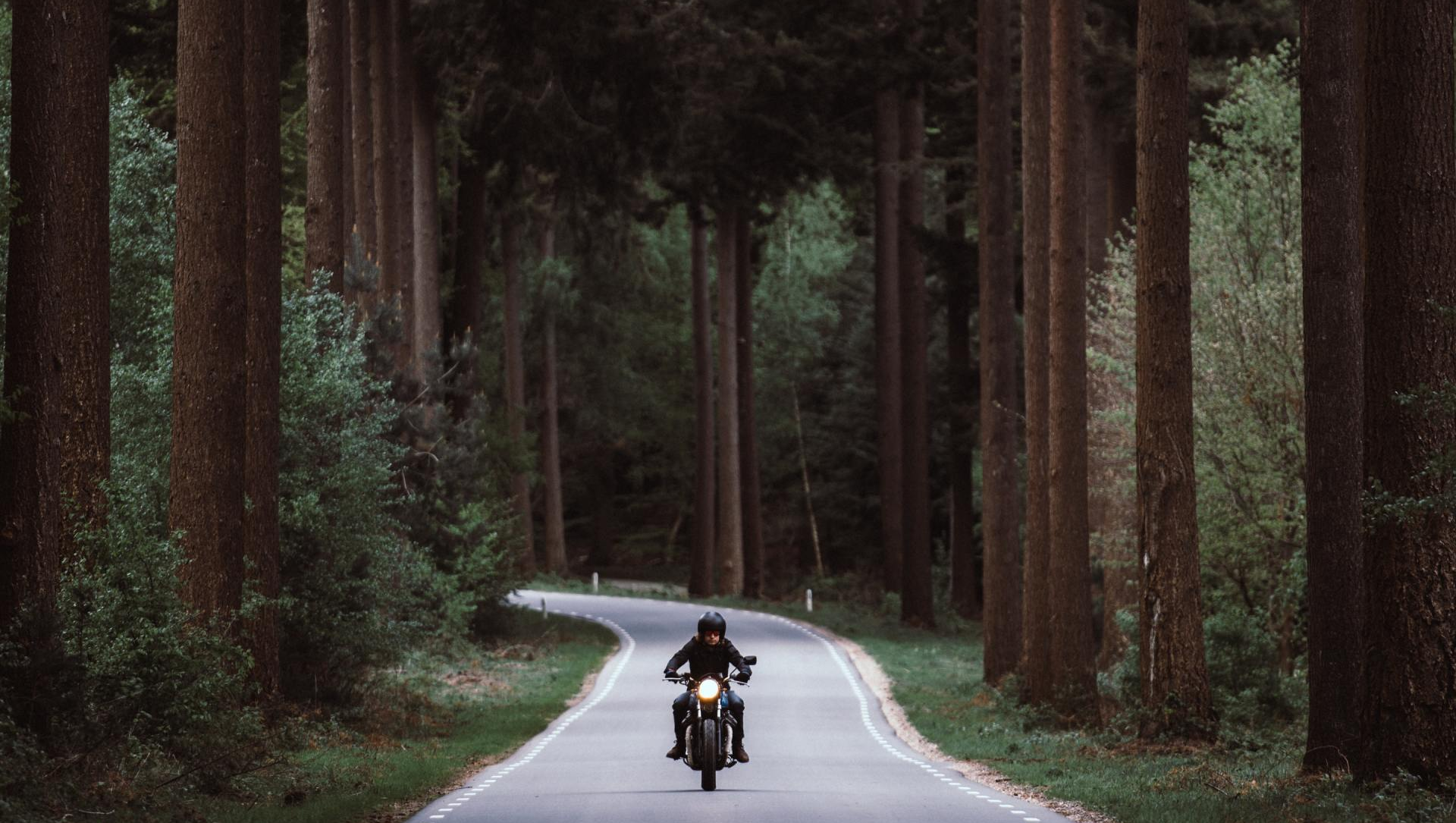
02 Useful Vocabulary
Read the below definitions. Then complete the quiz that follows.
- To push on (v) - to continue on a journey.
- To come up with (v) - to think of an idea, plan or solution.
- Safe and sound (adj) - usually used when we talk about the end of a trip. It means not hurt or damaged.
- To commute (v) - to make the same journey regularly between work and home.
- To set off (v) - to begin a journey.
- Arduous (adj) - involving or requiring strenuous effort; difficult and tiring.
Now, take the quiz. More than one answer may be possible. Choose the most appropriate answer.
03 Listen and fill in the blanks
Watch and listen to the video of our sample answers below. Use a notebook to take note of the answers. Then check your answers.
If you found this useful , you should check out more of our free lessons here!
Want to get 6.5 or above?
Join our ielts speaking masterclass course, © essential ielts 2021 | all rights reserved .
- Skip to main content
IELTS Podcast
Pass IELTS with expert help.
IELTS Vocabulary about Travel and Places
Home » IELTS speaking » IELTS vocabulary about Travel and Places
Passing the IELTS speaking test with a good grade will depend on your ability to answer the questions using appropriate vocabulary in the correct context.
Collocations are words that naturally combine to form a phrase.
These words when used in combination make the English speaker sound more fluent and natural. This is why you should be learning collocations under various subject headings to help you do well in the IELTS speaking test.
Answering questions about travel and holidays
It’s always a good idea to start with what you enjoy. What’s your favourite holiday destination or holiday resort? Is there a well-known tourist attraction or popular holiday destination in your country you could talk about? What is the main holiday period in your country or in your region? What tourist attractions are most popular during the national holidays?
These topics are so popular in the IELTS speaking test. They can be used to answer questions on lots of different themes (an interesting day, a terrible experience, your birthday for example).
But what if you’ve never been to a foreign country or on a guided tour? It doesn’t matter at all. Remember that you don’t have to tell the truth in an IELTS exam – you can say anything you like. Perhaps you heard a great story about a wildlife safari or a beach off the beaten track from one of your friends or family members and you get a question asking about YOUR favourite holiday – well, then your IELTS speaking exam should be easy!
Examples of questions about holiday travel
Part 1 questions.
Examiner: Where do you like to travel during the holidays?
Answer: I like to travel abroad but international travel can be expensive, so I usually plan affordable travel . Travelling to holiday destinations when it is out of season saves a lot of money. Out-of-season travel is also the best way to avoid places that are swarming with tourists.
Examiner: What are your favourite holiday pastimes?
Answer: I like to get away from it all . I look for exotic destinations with scenic views that are off the beaten track . I’d love to go on a wildlife safari! I tend to avoid guided tours and packaged deals as I prefer to go sightseeing on my own.
Examiner: How do you plan and prepare for your holiday?
Answer: I always do my research because I know exactly what I like. I thumb through holiday brochures and check travel sites like Airbnb on the Internet. I’m drawn to spectacular beaches and lush forests. I usually make advance reservations for self-catering accommodation .
Part 2 style questions
Examiner: describe one of your best travel experiences..
This type of question supports a when, where and who reply.
Answer: Last year a friend and I took a long-haul flight to Peru. We were travelling light so we were able to really get around . We stayed in quaint villages and hiked through lush rainforests . We were determined to do as the locals do , rather than go on guided tours, so we stayed with local people for part of the trip.
We visited colourful craft markets and brought back souvenirs, to remind us of our trip. One of my most memorable experiences was to the Sacred Valley of the Incas. It is a little bit off the beaten track but it is surrounded by great scenic beauty and magnificent landscapes.
Examiner: Describe a city that you think is interesting.
You should say:
- where it is
- what it is famous for
- how you knew this city
- explain why you think it is very interesting
Read and listen to the sample answer here .
Examiner: Describe a tradition in your country.
- who takes part in it
- what activities there are
- explain how you feel about it
Part 3 style questions
Examiner: What type of holiday destination do you think attracts most tourists?
Answer: I know that many people are drawn to wildlife safaris . This is certainly one of the big attractions in Africa. In Europe and Asia, the stunning architecture , museums and arts and culture attract thousands of tourists every year.
Examiner: Do you think that the tourism industry will continue to grow in the next two decades?
Answer: I do. Many European and Asian countries have aging populations who will have time on their hands in the future. Many of them are likely to seek holiday destinations around the world . Today there are many affordable destinations that offer good value for money.
Examiner: What do you think your country could do to attract more tourists?
Answer: My country has stringent visa regulations . If these were relaxed, I think that more visitors would choose to visit. We have an efficient public transport , plenty of accommodation and natural and historical places of interest.
IELTS Vocabulary to talk about Cities
- add to (its) attraction: make it more attractive
- thriving: lively and successful
- hustle and bustle: full of movement and noise
- a craze: an activity that suddenly becomes very popular
- a (holiday) resort: a popular destination for holidays
- a fascinating mix: different elements that go together really well
- steeped in history: full of history
- ultra-modern: very recent and new
- know like the back of (your) hand: be very familiar with, know everything about
- a home from home: a place where you feel very happy and comfortable
- tourist hot spots: places very popular with tourists
- soak up the atmosphere: observe and enjoy what’s happening around you
- a bit pricey: quite expensive
- easy going: relaxed, without pressure
- blend in: easily fit in with other people
IELTS Vocabulary about Travel
- Affordable destinations – Places within a reasonable price range
- Affordable travel – Travel which is within your price range
- Around the world – In all corners of the globe
- Arts and culture – The art, music and other cultural aspects of an area
- Craft markets – Stalls where goods made by the local people are sold
- Do as the locals do – Enjoy the activities as the local people do
- Efficient public transport – A functioning transport system intended for the use of residents and visitors
- Exotic destinations – Unusual or strange holiday destinations
- Get around – Get from place to place
- Guided tours – Walking, hiking or driving visits led by a guide who knows the area
- Holiday brochures – Pamphlets advertising holiday destinations
- Holiday destination – Place to which you leave on holiday
- Long-haul flights – Long distance flights
- Lush rainforests – Luxuriant equatorial forests
- Magnificent landscapes – Impressive scenery
- Make advance reservations – Booking ahead of time
- Memorable experiences – Activities that you will remember for years
- Off the beaten track – A place that is not on the main thoroughfare
- Out of season – Outside the most popular holiday period
- Packaged deals – Travel deals that are put together by an agency and sold as a package
- Quaint villages – Old-fashioned or charming small towns
- Scenic views – Lovely scenes
- Self-catering accommodation – A Place to stay where you see to your own food
- Spectacular beaches – Impressive sandy shorelines
- Stunning architecture – Magnificent buildings
- Swarming with tourists – Full of holidaymakers
- Time on their hands – Available time to do as you choose
- To get away from it all – To get away from everyday routines
- To go sightseeing – Take a trip around an area to see what it has to offer
- Travel abroad – Travel to overseas destinations
- Travelling light – Travelling with little luggage
- Value for money – A good return on investment
- Visa regulations – Laws that relate to entry into a country
- Wildlife safari – A guided tour through a game park
Click here for a free master list of collocations!
More IELTS Speaking tutorials
More IELTS vocabulary tutorials to help you enhance your vocabulary and prepare for your IELTS exam.
- Vocabulary about climate change
- Vocabulary about fashion and shopping
- Vocabulary about advertising
- Vocabulary about social media
- Vocabulary about food and nutrition
- Vocabulary about family and friends
- Vocabulary about sport
- Vocabulary about the Coronavirus
- IELTS Speaking Part 2 Cue Cards about People
- IELTS Speaking Part 2 Cue Cards about Places
- IELTS Speaking Part 2 Cue Cards about Shopping
- IELTS Speaking Cue Cards about Accommodation

Free IELTS lessons signup

- Academic practice
- General practice
- Task 1 Academic
- Task 1 General
- Task 2 (essay)
IELTS Speaking Vocabulary. Travel & Holidays
Before starting to practice answering various IELTS Speaking topics you should learn some topic vocabulary to know how to structure your answer.
On this page you can find useful IELTS speaking vocabulary with sentence examples for Travel & Holidays topic. This vocabulary is very useful to answer questions about travel and holidays and achieve a high score on IELTS Speaking test.
See IELTS Speaking sample about Travel & Holidays >
- accommodation: a room or building in which you stay during holidays or live. While I'm travelling, my favourite types of accommodation are hotels.
- all holiday : a time after you lost your job. He lost his job yesterday. Now it’s all holiday for him.
- all-inclusive : a hotel deal where the price includes accommodation, meals and drinks at any time. I've never thought that hotels with all-incusive service are so comfortable! You can grab a piece of cake at 6 a.m. or get a cocktail at midnight.
- half-board : if you request 'half-board' at a hotel, breakfast and dinner would be included in the hotel price (as part of the package). John and Lily liked their tour with half-board service. They spent breakfasts and dinners in the hotel and bought lunches in the nearby cafes.
- full-board : if you request 'full-board' at a hotel, that would include all three meals (breakfast, lunch and dinner) in the price of your accommodation.
- self-catering : a holiday deal where meals are not provided. Mary thinks that self-catering is neither pleasant nor efficient.
- to book (something) : to arrange and confirm a place on a flight, a room in a hotel or a ticket for an event in the future. If you book your plane tickets in advance, they will be much cheaper.
- breathtaking view : an amazing view. I’ve seen many breathtaking views during my journey to Paris.
- busman's holiday : when you spend your free time similarly to the time when you work. This expression comes from the idea that a bus driver would spend his holiday traveling somewhere on a bus. Unfortunately, many people spend a busman’s holiday nowadays.
- charter flight : a cheap regular flight. Due to our modest budget, we had to take a charter-flight.
- check-in desk : the place at the airport where you register for your flight and deposit your luggage.
- far-off destination : a distant place. Australia is a far-off destination, nonetheless I want to visit it.
- getting away from it all : escaping in order to rest from a daily routine. After I passed my exams, I wanted to get away from it all for at least a couple of days.
- go off the beaten track : to visit an uncommon place. Unlike my brother, I prefer to go off the beaten track.
- guided tour : a tour in which a group of people is guided by an expert. Guided tours are a great way to learn about different places of interest.
- head for : go in a direction for. I’m heading for France for my next holidays.
- holiday brochure : a publication with details of holiday. Our guide gave us a great brochure about our hotel.
- holiday destination : where you go for a holiday. We chose New York as our holiday destination for the next summer.
- holiday of a lifetime : a very special holiday, once in a lifetime. Last year me and my family had a holiday of a lifetime in Italy.
- holiday resort (tourist resort) : a place where lots of people go for a holiday. Last year my family went on a journey to London. We lived in a great tourist resort.
- hordes of tourists : crowds of tourists. Hordes of tourist can be seen during summer near the city park.
- in the middle of nowhere : in a place that is far away from where most people live. My grand-mother lives in the middle of nowhere, but she loves her old little village.
- local crafts : thighs made in the region. My sister bought some amazing local crafts on her trip to India.
- out of season : not within the main holiday period. I decided to go on a journey with my friends out of season.
- passport control : a place where you get your passport checked. I spent a few hours waiting in line on a passport control.
- package tour : a holiday at a fixed price in which the travel company arranges your travel, hotels, and sometimes meals for you: We bought a cheap package tour to Italy and stayed in a big hotel by the sea.
- picturesque village : a nice, beautiful village. My grandparents live in a picturesque village.
- places of interest : memorable and honorable places. My native city has a variety of places of interest.
- short break : a little holiday. My father had a short break this year, I hope he’ll be able to relax some more.
- stunning landscape : a beautiful countryside. Stunning landscapes are only one of many reasons why I want to visit Africa.
- to go sightseeing : to go visiting sights of interest. Today we went sightseeing with my friends.
- to travel on foot / horse When I'm in a small town I prefer to travel on foot.
- to travel by bus / plane / car / bicycle / motorcycle Although I usually travel by car, when I decided to visit Paris I had to travel by plane.
- tourist attractions : places which tourists tend to visit. Despite not being a tourist attraction, new fountain is very popular among the locals.
- tourist trap : place with many tourists. We've visited many tourists traps lately.
- travel agency : a shop that specializes in booking holidays. I've bought tickets for my trip through a travel agency.
- wildlife safari : an observational holiday, mainly in Africa. I’d love to go on a wildlife safari sometime.
- youth hostel : a cheap hotel. During our trip we stayed in a hostel, because we didn’t have enough money for a hotel.
- IELTS Scores
- Life Skills Test
- Find a Test Centre
- Alternatives to IELTS
- General Training
- Academic Word List
- Topic Vocabulary
- Collocation
- Phrasal Verbs
- Writing eBooks
- Reading eBook
- All eBooks & Courses
- IELTS Vocabulary
Travel and Tourism Vocabulary for IELTS
This travel and tourism vocabulary for IELTS will help you with any speaking questions that may come up around this topic or essays related to it.
You may know some of the words, but you can see examples of them in context which will help you know how to use them correctly.
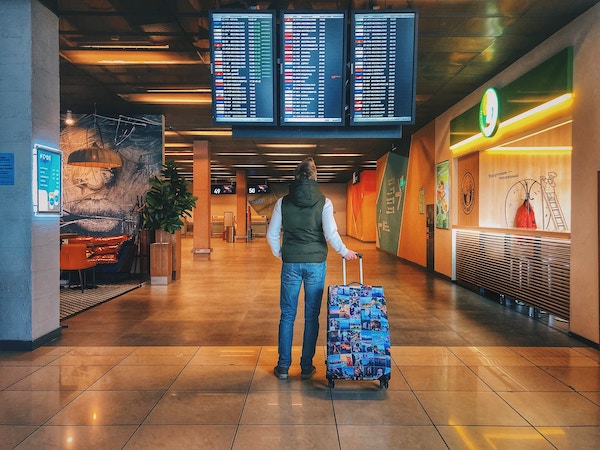
Accommodation
A place to stay overnight or for a period of time.
- "We booked a comfortable accommodation near the beach for our summer vacation."
- "The hotel offers a range of accommodations, from standard rooms to luxurious suites."
An exciting or daring experience, often associated with outdoor activities.
- "He decided to go bungee jumping as he wanted to experience an adrenaline-pumping adventure."
- "We embarked on an exciting adventure by taking a safari tour in the African savannah."
Attractions
Places or things that are interesting or captivating to visit.
- "The city is famous for its numerous attractions, such as museums, parks, and historic landmarks."
- "We visited all the popular tourist attractions in London, including the Tower of London and Buckingham Palace."
Backpacking
A style of travel involving carrying all necessary belongings in a backpack and staying in budget accommodations.
- "She went backpacking through Southeast Asia, staying in hostels and meeting fellow travelers along the way."
- "Backpacking allows you to explore different destinations on a tight budget."
A trip or vacation on a ship, usually involving stops at different ports.
- "My parents are going on a Mediterranean cruise, visiting several countries in the region."
- "We enjoyed a luxurious cruise around the Caribbean, stopping at beautiful tropical islands."
The style of cooking or particular dishes associated with a specific region or culture.
- "I can't wait to try the local cuisine, especially the traditional street food."
- "The restaurant specializes in Italian cuisine, offering a variety of pasta and pizza dishes."
The customs, traditions, arts, and social institutions of a particular group of people.
- "Immersing yourself in the local culture is an important aspect of traveling."
- "We attended a traditional dance performance to experience the local culture."
The money used in a particular country.
- "You should exchange your currency to the local currency before traveling to avoid any inconvenience."
- "The hotel accepts various currencies, including US dollars and Euros."
Destination
A place where people travel to or visit.
- "Paris is a popular tourist destination known for its beautiful architecture and rich history."
- "I am planning my next vacation and cannot decide on a destination yet."
The presence of a wide range of human differences within a group, organisation, or society, encompassing aspects such as race, ethnicity, gender, sexual orientation, socio-economic status, age, religion, ability, and more.
- "One of the most enriching aspects of traveling abroad is experiencing the diversity of cultures firsthand, from sampling traditional foods to participating in local customs and rituals."
- "In bustling cities like London and New York, the diversity of people you encounter while exploring the streets highlights the global interconnectedness of travel, offering a mosaic of languages, traditions, and perspectives."
Responsible travel to natural areas while minimizing the negative impact on the environment and supporting local communities.
- "We participated in an ecotourism program, where we learned about sustainable agriculture practices in the rainforest."
- "Ecotourism has become increasingly popular as travelers seek authentic experiences with minimal environmental impact."
A journey undertaken for a specific purpose, often involving exploration or research.
- "The scientific expedition aims to study the wildlife in the remote rainforest."
- "We joined an expedition to climb the highest peak in the region."
A person who leads or shows the way, providing information and assistance to travelers.
- "The tour guide explained the history and significance of the ancient ruins."
- "We hired a local guide to navigate through the bustling markets."
A book providing information on a specific place, including recommendations for sightseeing and accommodations.
- "I bought a guidebook for New York City to help plan my itinerary and find the best restaurants in the area."
- "The guidebook contains maps and useful tips for travelers."
A vacation taken by newlyweds immediately following their wedding.
- "They went on a romantic honeymoon to the Maldives, enjoying private beach villas and romantic candlelit dinners."
- "The couple decided to postpone their honeymoon due to work commitments and planned to take it later in the year."
Hospitality
The friendly and welcoming treatment of guests or strangers.
- "The locals showed us great hospitality, ensuring we had a comfortable stay in their town."
- "The hotel staff provided excellent hospitality, going above and beyond to meet our needs."
An inexpensive lodging option, offering shared rooms and facilities, often used by budget travelers.
- "We stayed at a hostel in Amsterdam, meeting other young travelers from different parts of the world."
- "The hostel provides free breakfast and Wi-Fi for its guests."
A plan or schedule of a trip, including the places to visit and the activities to be done.
- "I have prepared a detailed itinerary for our trip to Thailand, including all the tourist attractions we want to see."
- "Make sure to check your itinerary to see if there are any changes to the departure time."
A temporary sleep disorder caused by traveling across different time zones.
- "After flying from New York to Tokyo, I experienced severe jet lag and had trouble adjusting to the new time zone."
- "To prevent jet lag, it is advisable to stay hydrated and try to sleep on the plane."
A notable or recognizable feature of a landscape or place.
- "The Eiffel Tower is one of the most iconic landmarks in Paris."
- "We took a selfie in front of the famous landmark."
Relating to or characteristic of a particular place or its inhabitants.
- "We enjoyed trying the local cuisine and interacting with the friendly locals."
- "The local tour guide showed us around and shared interesting stories about the area."
The physical world and its natural features, including plants, animals, and landscapes.
- "The national park is known for its breathtaking natural beauty, with stunning waterfalls and lush forests."
- "We went hiking to experience the wonders of nature."
Off the beaten path
The activity of visiting interesting or famous places.
- "We spent the whole day sightseeing in Rome, visiting iconic landmarks such as the Colosseum and the Vatican."
- "The city offers various sightseeing tours, allowing visitors to explore the best attractions."
A place designed for relaxation and recreation, offering leisure amenities and often located in attractive surroundings.
- "The beachfront resort provides luxurious accommodation, spa facilities, and a private beach."
- "We booked a family-friendly resort that has a kids' club and swimming pools."
Sightseeing
Referring to places or routes that are not frequently traveled by tourists, often offering unique and authentic experiences.
- "During our trip to Italy, we decided to venture off the beaten path and explore the charming villages nestled in the countryside".
- "Instead of sticking to the crowded tourist hotspots in Thailand, we opted for an off the beaten path adventure, trekking through remote jungles and discovering hidden waterfalls that few travelers have ever seen".
A memento or keepsake often purchased as a reminder of a trip or experience.
- "I bought a beautiful handmade necklace as a souvenir from my trip to Bali."
- "The souvenir shop offers a wide range of products, including keychains, magnets, and t-shirts."
Stereotyping
The process of making assumptions or generalisations about a group of people based on characteristics such as race, ethnicity, nationality, gender, or other factors, often oversimplifying or exaggerating traits and ignoring individual differences.
- "Despite its reputation for being unsafe, John found that his experience traveling in South America shattered the stereotyping he had heard, as he encountered warmth and hospitality from the locals in every city he visited."
- "While planning her trip to Asia, Sarah was warned by friends to be cautious of pickpockets and scams, but upon arrival, she discovered that such stereotyping didn't accurately reflect the diverse and welcoming cultures she encountered throughout her journey."
A guided journey or trip, often with a planned itinerary and organized by a travel company.
- "We are going on a guided city tour to explore the main attractions."
- "The tour includes transportation, accommodation, and meals."
A person who is traveling or visiting a place for pleasure or leisure.
- "The city attracts millions of tourists each year due to its historical significance and cultural diversity."
- "The tourist asked a local for directions to the nearest museum."
A person who is traveling, particularly for leisure or business.
- "As an avid traveler, she has visited over 30 countries around the world."
- "The fellow traveler recommended a hidden gem restaurant in the city."
An endorsement on a passport granting permission to enter, leave, or stay in a country for a specified period.
- "I need to apply for a visa before I can travel to China."
- "Her visa expired, so she had to leave the country and reapply for a new one."
View an International Travel and Prejudiced Essay which uses travel and tourism vocabulary for IELTS
More Topic Related Vocabulary:
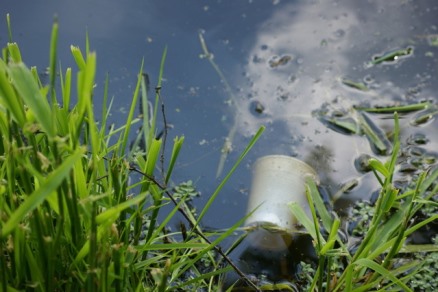
Environment Vocabulary for IELTS
Environment vocabulary words and definitions that you can learn in order to increase your score for the IELTS test.

The Arts Vocabulary
Learn about the Arts vocabulary to help you in the IELTS test for speaking, writing, reading and listening.

Crime Vocabulary for IELTS
Crime vocabulary to help you with IELTS essays and speaking. Common Crime Words.
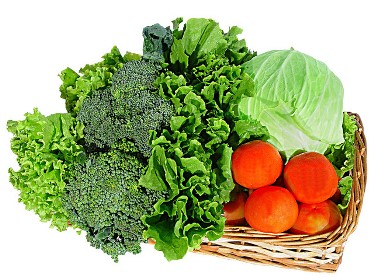
Health Vocabulary
This health vocabulary includes useful words to talk and write about health, ftiness and food

Work Vocabulary for IELTS
Work vocabulary to improve your IELTS score. The words are related to the topics of jobs, careers and occupations.
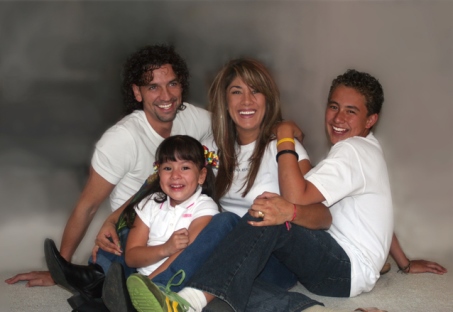
Children and the Family Vocabulary
Children and the Family Vocabulary for IELTS - essential vocabulary to help to improve your score for IELTS

Information Technology Vocabulary for IELTS
Learn information technology vocabulary, which provides you with a new word, a definition, and then the word in context.

Science Vocabulary for IELTS
Science vocabulary to improve your score for the IELTS test. Learn words that can be used in the test, with examples and definitions.

Education Vocabulary for IELTS
Learn useful education vocabulary for IELTS to help you with your writing, speaking and reading.
Any comments or questions about this page or about IELTS? Post them here. Your email will not be published or shared.
Before you go...
Check out the ielts buddy band 7+ ebooks & courses.

Would you prefer to share this page with others by linking to it?
- Click on the HTML link code below.
- Copy and paste it, adding a note of your own, into your blog, a Web page, forums, a blog comment, your Facebook account, or anywhere that someone would find this page valuable.
Band 7+ eBooks
"I think these eBooks are FANTASTIC!!! I know that's not academic language, but it's the truth!"
Linda, from Italy, Scored Band 7.5

IELTS Modules:
Other resources:.
- All Lessons
- Band Score Calculator
- Writing Feedback
- Speaking Feedback
- Teacher Resources
- Free Downloads
- Recent Essay Exam Questions
- Books for IELTS Prep
- Useful Links

Recent Articles
Paraphrasing in the IELTS Test: Speaking and Writing
May 03, 24 10:26 AM
Fillers for IELTS Speaking: Avoid 'Eh', Uhm', 'You know'.
Apr 27, 24 05:48 AM
Decreasing House Sizes Essay
Apr 06, 24 10:22 AM

Important pages
IELTS Writing IELTS Speaking IELTS Listening IELTS Reading All Lessons Vocabulary Academic Task 1 Academic Task 2 Practice Tests
Connect with us
Copyright © 2022- IELTSbuddy All Rights Reserved
IELTS is a registered trademark of University of Cambridge, the British Council, and IDP Education Australia. This site and its owners are not affiliated, approved or endorsed by the University of Cambridge ESOL, the British Council, and IDP Education Australia.
The official IELTS by IDP app is here! Download it today.
- IELTS tests IELTS Academic IELTS General Training IELTS UKVI IELTS One Skill Retake LEARN ABOUT THIS TEST What is IELTS Academic? Reschedule or cancel an IELTS test Find a test centre WAYS TO TAKE IELTS ACADEMIC IELTS on paper IELTS on computer IELTS Online LEARN ABOUT THIS TEST What is IELTS General Training? Reschedule or cancel an IELTS test Find a test centre WAYS TO TAKE IELTS GENERAL TRAINING IELTS on paper IELTS on computer LEARN ABOUT THIS TEST What is IELTS UKVI? Reschedule or cancel an IELTS test Find a test centre WAYS TO TAKE IELTS UKVI IELTS on paper IELTS on computer LEARN ABOUT THIS TEST What is IELTS One Skill Retake? Reschedule or cancel an IELTS test READ MORE ABOUT IELTS ONE SKILL RETAKE Where is IELTS One Skill Retake available? FIND THE RIGHT TEST IELTS for study IELTS for work IELTS for migration
English self-assessment tool
Assess your level of English and get access to a personalised preparation plan now.
Get your results
Check your provisional IELTS results online and do more.

Expand your IELTS vocabulary – Travel & holidays
Expanding your vocabulary using travel terms
Content Tags
Additional links.
Welcome to our four-part series on expanding your vocabulary for the IELTS exam. Don’t forget to check out the other three posts:
Expanding your IELTS Vocabulary – Education
Expanding your IELTS Vocabulary - Transportation
Expanding your IELTS Vocabulary - Environment
In this post, we’ll be exploring the topic of travel and holidays. Once again, we’ll present you with important sub-topics for your vocabulary sets and suggested vocabulary items to get you started. However, this time we’ll begin by focusing on the words ‘travel’ and ‘holiday’ and their collocations, to make sure that you can use these important terms flexibly on your IELTS:
Travel (noun)
Travel (verb), holiday (noun), holiday (verb), vocabulary sets related to travel & holidays.
Now that we have looked at using the words ‘travel’ and ‘holiday’ in a variety of contexts, it’s time to explore two relevant sub-topics that can also help you to talk or write about travel and holidays on your IELTS.
Keep in mind that this common theme may come up in any of the three parts of the Speaking module of the test: from talking about your travel experiences, to describing your dream holiday, to discussing international travel in more depth. In addition, you may have to write about travel and holidays for Writing Task 2.
1. Tourism & holidays
2. holiday arrangements.
Finally, it's likely that you’ll need to also use vocabulary from other common IELTS themes when talking about travel and holidays. For example, you may need to use vocabulary related to transportation when talking about getting to and from a holiday destination. Or you may be asked to talk about the impact of travel and tourism on the environment, in which case you’ll be required to use words and phrases related to the environment. So make sure you focus not just on one or two common IELTS themes when working on expanding your vocabulary for the test but on all of the topics presented to you in this article.
Share this article
You may also like.
Grammar 101: Its vs. It's
Six daily habits for a higher Speaking band score
The A to Z of IELTS: B is for 'blue' and 'black' idioms
The A to Z of IELTS: C is for 'collocations'
The A to Z of IELTS: E is for Essays
IELTS Speaking: How to perform at your best in part 1
IELTS Speaking: How to perform at your best in the part 3 discussion
IELTS Speaking: How to perform at your best in the part 2 long turn
IELTS Reading test: how to manage your time?
Grammar 101: Affect vs. Effect
- Useful links
- Who accepts IELTS?
- News and articles
- IELTS Masterclass
- Your IELTS results
- IELTS General Training
- IELTS Academic
- IELTS Online
- IELTS by IDP app
- Find a test centre
- Middle East
- Netherlands
- New Caledonia
- New Zealand
- Papua New Guinea
- Philippines
- Saudi Arabia
- Solomon Islands
- South Korea
- Switzerland
- Legal notices
- Privacy policy
- Cookie policy
- Copyright 2024 IDP IELTS
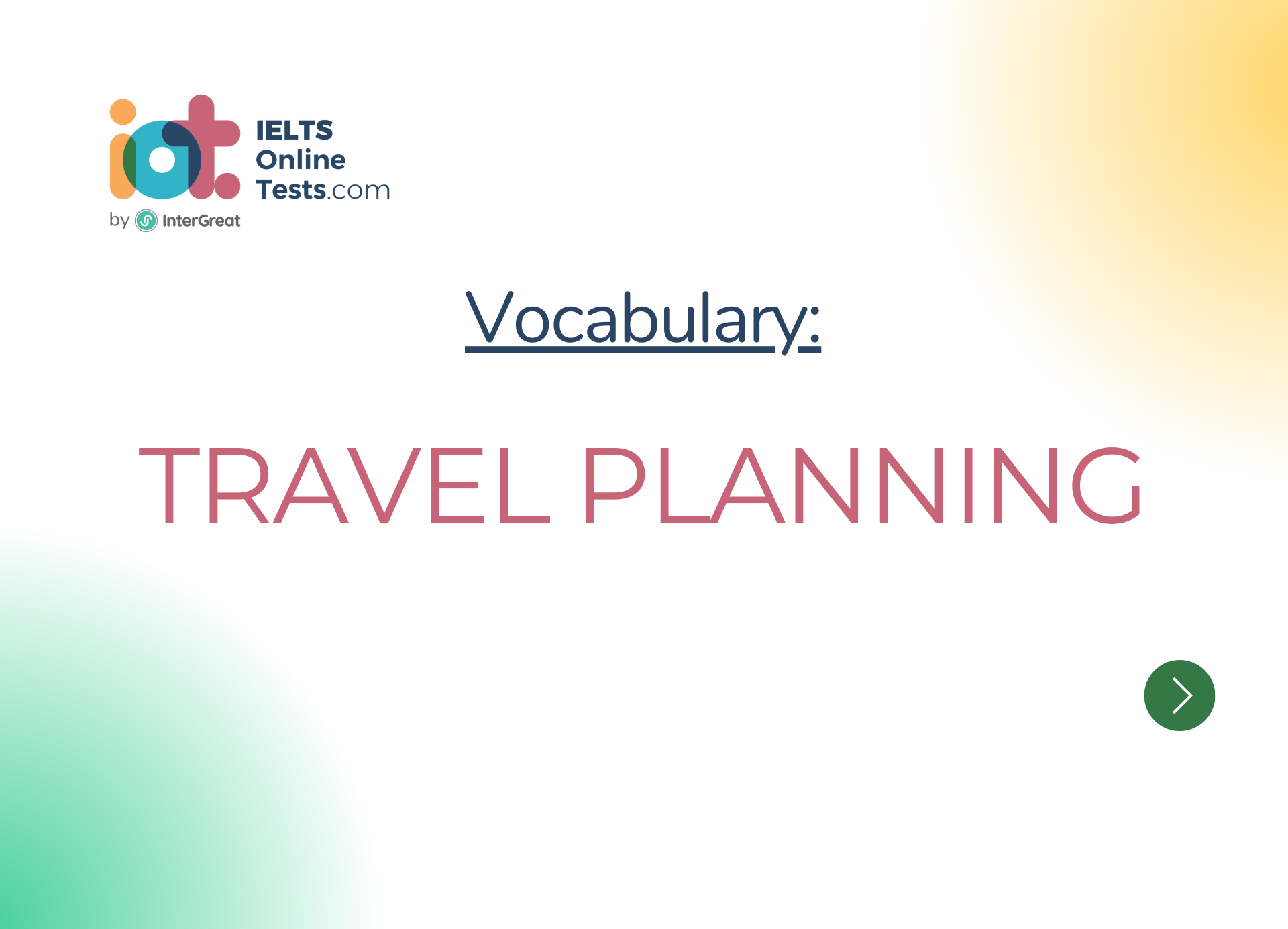
Travel planning
Below is a detailed list of vocabulary related to "Travel planning" suitable for IELTS band 6.5-8.0:
Itinerary :
- Definition: A detailed plan or schedule of a journey, including dates, times, and activities.
Destination :
- Definition: The place to which someone is traveling or where a journey is intended to end.
Accommodation :
- Definition: A place where travelers can stay, such as a hotel, hostel, or vacation rental.
Transportation :
- Definition: The means of travel used to get from one place to another, such as planes, trains, buses, or rental cars.
- Definition: A journey made through the air, typically using an airplane.
Hotel Reservation :
- Definition: Booking a room or accommodation in advance at a hotel.
- Definition: The process of arriving at a hotel or accommodation and registering as a guest.
Check-out :
- Definition: The process of departing from a hotel or accommodation after settling the bill and returning the room key.
Travel Insurance :
- Definition: Insurance that provides coverage for unexpected events, such as trip cancellations, medical emergencies, or lost luggage, during travel.
- Definition: An official document or endorsement stamped in a passport that allows a person to enter, stay, or leave a particular country.
- Definition: An official government document that identifies a person and allows them to travel internationally.
Currency Exchange :
- Definition: The process of converting one country's currency into another for financial transactions during travel.
Travel Budget :
- Definition: A financial plan that outlines estimated expenses for a trip, including accommodation, food, transportation, and activities.
Travel Guidebook :
- Definition: A book that provides information and recommendations about a destination, including attractions, restaurants, and local customs.
Local Cuisine :
- Definition: The traditional food and dishes of a specific region or country that travelers may try during their trip.
Sightseeing :
- Definition: The activity of visiting famous or interesting places and landmarks in a destination.
Cultural Activities :
- Definition: Events and experiences that allow travelers to engage with the local culture, such as attending festivals, museums, or art galleries.
Tourist Attractions :
- Definition: Popular places or sites that draw visitors due to their historical, cultural, or natural significance.
Travel Documents :
- Definition: Essential paperwork required for travel, including passports, visas, and travel insurance.
Travel Agent :
- Definition: A professional who assists travelers in planning and booking their trips, providing advice and arranging transportation and accommodation.
Travel Advisory :
- Definition: Official advice issued by governments or authorities about the safety and security of traveling to specific destinations.
Travel Restrictions :
- Definition: Rules and regulations that limit or control travel to certain places, often in response to emergencies or health concerns.
Itinerary Changes :
- Definition: Modifications or adjustments made to a travel plan due to unforeseen circumstances.
Local Transportation :
- Definition: Modes of transportation used within a destination, such as buses, taxis, or subway systems.
- Definition: Suitcases, bags, and containers used to carry personal belongings during a trip.
Packing List :
- Definition: A checklist of essential items to pack for a trip, including clothing, toiletries, and travel documents.
Travel Adapters :
- Definition: Devices used to convert electrical outlets and plugs to match the voltage and socket type of a specific country.
Travel Apps :
- Definition: Mobile applications that provide useful information, booking services, or travel tips for travelers.
Travel Rewards Program :
- Definition: Loyalty programs offered by airlines, hotels, or credit cards that provide benefits, discounts, or points for frequent travelers.
Souvenirs :
- Definition: Items or mementos purchased as keepsakes or gifts to remember a trip or destination.
Cultural Etiquette :
- Definition: The customary behavior and manners expected in a specific culture or country.
Travel Etiquette :
- Definition: The polite and respectful behavior expected of travelers, such as being mindful of local customs and rules.
Emergency Contact Information :
- Definition: Important phone numbers and contact details to use in case of emergencies during the trip.
Travel Photography :
- Definition: The act of capturing photographs while traveling to document the journey and experiences.
Solo Travel :
- Definition: Traveling alone without companions or a group.
By incorporating these vocabulary words into your studies and practice, you can enhance your language proficiency and be better prepared for the IELTS exam. Best of luck!
Share with friends
Scan below qr code to share with your friends, related ielts tips.

Higher education systems
Here are some vocabulary words related to higher education systems for...

Personal finance
Here's a detailed list of vocabulary related to personal finance for the...

Professional skills
Here are some vocabulary words related to professional skills:

School subjects
Here's a lesson on vocabulary related to "School Subjects" for the IELTS...

Marketing strategies
Here are some vocabulary words related to marketing strategies for IELTS...
Thank you for contacting us!
We have received your message.
We will get back within 48 hours.
You have subscribed successfully.
Thank you for your feedback, we will investigate and resolve the issue within 48 hours.
Your answers has been saved successfully.
Add Credits
You do not have enough iot credits.
Your account does not have enough IOT Credits to complete the order. Please purchase IOT Credits to continue.


What is IELTS Score?
IELTS score between 1 and 9 for each part of the test – Listening, Reading, Writing and Speaking. You can score whole (e.g., 5.0, 6.0, 7.0) or half (e.g., 5.5, 6.5, 7.5) bands in each part. Universities often demand an IELTS score of 6 or 7. They may also demand a minimum IELTS score in each of the 4 sections.
IELTS scoring system and band scale
The IELTS scoring system is very unique composed of 9 bands, measured in consistent manner and is internationally acclaimed and understood. The IELTS score ranges from 1 to 9 for each part of the test. The individual result from these four parts will produce an overall band score ... more →
How long does it take to do the IELTS test?
IELTS has four parts – Listening (30 minutes), Reading (60 minutes), Writing (60 minutes) and Speaking (11–14 minutes). The total test time is 2 hours and 45 minutes. The Listening, Reading and Writing tests are done in one sitting.
Is IELTS valid for 3 years now?
The IELTS Test Report Form (TRF) is valid for two years. At present, IELTS score is valid for a three year period for Australian General Skilled Migration (GSM) applications.
Is there any pass or fail in the IELTS exam?
There is no pass or no fail in the IELTS exam. Generally, when you take any test or exam then there can be the possibility of getting passed or failed. But here in this case, you will not get failed but you may be disqualified to continue your higher education in choice of college or university.
Home → IELTS Speaking Vocabulary
Ielts speaking vocabulary – travel and holidays.
Before starting to practice answering various IELTS Speaking topics you should learn some topic vocabulary to know how to structure your answer.
On this page you can find useful IELTS speaking vocabulary with sentence examples according to the Travel and Holidays topic. This vocabulary is very useful to answer questions about travel and holidays and achieve a high IELTS score on IELTS speaking test .
While I”m traveling, my favorite types of accommodation are hotels.
He lost his job yesterday. Now it’s all holiday for him.
I have never thought that hotels with all-incusive service are so comfortable! You can grab a piece of cake at 6 a.m. or get a cocktail at midnight.
John and Lily liked their tour with half-board service. They spent breakfasts and dinners in the hotel and bought lunches in the nearby cafes.
- full-board : if you request “full-board” at a hotel, that would include all three meals (breakfast, lunch and dinner) in the price of your accommodation.
Mary thinks that self-catering is neither pleasant nor efficient.
If you book your plane tickets in advance, they will be much cheaper.
I’ve seen many breathtaking views during my journey to Paris.
Unfortunately, many people spend a busman’s holiday nowadays.
Due to our modest budget, we had to take a charter-flight.
- check-in desk : the place at the airport where you register for your flight and deposit your luggage.
Australia is a far-off destination, nonetheless I want to visit it.
After I passed my exams, I wanted to get away from it all for at least a couple of days.
Unlike my brother, I prefer to go off the beaten track.
Guided tours are a great way to learn about different places of interest.
I’m heading for France for my next holidays.
Our guide gave us a great brochure about our hotel.
We chose New York as our holiday destination for the next summer.
Last year me and my family had a holiday of a lifetime in Italy.
Last year my family went on a journey to London. We lived in a great tourist resort.
Hordes of tourist can be seen during summer near the city park.
My grand-mother lives in the middle of nowhere, but she loves her old little village.
My sister bought some amazing local crafts on her trip to India.
I decided to go on a journey with my friends out of season.
I spent a few hours waiting in line on a passport control.
We bought a cheap package tour to Italy and stayed in a big hotel by the sea.
My grandparents live in a picturesque village.
My native city has a variety of places of interest.
My father had a short break this year, I hope he’ll be able to relax some more.
Stunning landscapes are only one of many reasons why I want to visit Africa.
Today we went sightseeing with my friends.
When I”m in a small town I prefer to travel on foot.
Although I usually travel by car, when I decided to visit Paris I had to travel by plane.
Despite not being a tourist attraction, new fountain is very popular among the locals.
We have visited many tourists traps lately.
I have bought tickets for my trip through a travel agency.
I’d love to go on a wildlife safari sometime.
During our trip we stayed in a hostel, because we didn’t have enough money for a hotel.
Related IELTS Resources
Take a practice test to find out what is your current weakness in terms of IELTS scale and allow more time to improve your weak spots. The following IELTS resources will help you to develop your skills faster:
- IELTS Listening Test
- IELTS Reading Test
- IELTS Writing Task 1
- IELTS Writing Task 2
- IELTS Speaking Part 1, 2 & 3
- IELTS Listening Exercises
- IELTS Reading Exercises
- IELTS Cue Card Exercises
- How to Start IELTS Preparation
- Tips – On the Day before IELTS Exam
IELTS Vocabulary List – 4 for Writing task 2
Ielts speaking vocabulary – technology, recommended for you.
IELTS Speaking Vocabulary (Topics wise)
IELTS Speaking Vocabulary – Health
IELTS Speaking Vocabulary – Books and Films
Comments (0), leave a reply cancel reply.
You must be logged in to post a comment.
- Ebooks & Courses
- Practice Tests
- Transportation Vocabulary
This page contains over 120 key words and phrases of transportation vocabulary with explanations and examples of how to use them in a sentence. This will help you to learn how to use them correctly.
Transportation is a common everyday topic in many people’s lives so it’s not surprising that it's a popular subject in the IELTS exam. It thus makes sense to learn a good variety of transportation vocabulary to help you answer any questions that come up.
Here are a few things you could be asked about:
- Public transport in your town or city
- A specific type of transportation
- A journey you’ve made
- Common problems related to transportation
- Transportation & the environment
- The future of transportation
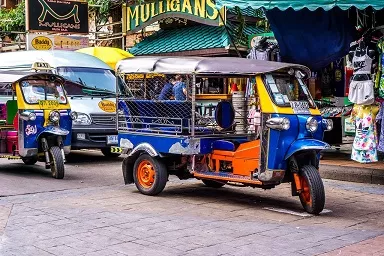
Don’t try to learn all 120+ words and phrases. Look at my suggestions below as to the best way to use this comprehensive list.
To ensure that you’re well prepared to answer any transport-related questions, I’ve included four things here:
- IELTS-style questions on the topic of transportation
- Sample answers
- A list of common transportation vocabulary with definitions & sample sentences
- Links to online reading and listening resources
You’ll find PDF downloads of both the questions and sample answers and the transportation vocabulary list at the bottom of the respective sections.
Although the topic could come up in any part of the exam, the questions on this page relate to the Speaking test because this part of the exam offers the broadest range of possible questions on the subject. They give the best opportunity for me to demonstrate the vocabulary and for you to practise using it.
I’ve included IELTS-style questions and answers for all three parts of the Speaking test and have highlighted keywords and phrases in bold .
You'll find these words and phrases, and many others, in the vocabulary list beneath along with explanations and sample sentences and an audio to listen to the pronunciation.
The transportation vocabulary list contains words and phrases relevant to all parts of the IELTS exam as you may be asked to write about the topic or get a reading or listening text about transport.
Finally, at the bottom of the page, I've added links to topical articles, short videos and podcasts that will help you to improve both your transportation vocabulary and your reading and listening skills.
IELTS-Style Speaking Test Questions and Answers
1) What kinds of public transport are there where you live?
We do have a bus service in my area. It’s fine for people who live in the towns but not so regular for those living in the many small villages. There is also a train that goes to the nearest city a few times a day.
2) Do you prefer public transport or private transport?
I definitely like private transport best. With my car , I can go where I want to whenever I choose to. To make a journey on public transport , you are not so independent .
3) How do you travel to work?
In the winter, when it’s cold and wet, I drive my car to work but I always get stuck in a t raffic jam . As the weather improves, I go by bike to avoid the congestion .
4) Is a bicycle a good means of transport?
Most certainly, because you don’t get held up in heavy traffic . Cycling also keeps you fit and is environmentally-friendly .
5) Do you think that there should be a separate lane for bicycles?
I think that cycle lanes are a very good idea as they help to keep cyclists safe from vehicles . Since we introduced them in my country, more people have started cycling to work.

Describe a method of transport that you enjoy using.
You should say:
- what kind of transport it is
- how often you use it
- where you travel using it
and explain why you enjoy using it.
One form of transport that I look forward to going on is a train . This is because I only use it when I’m going away somewhere exciting, like on holiday or a weekend break.
We have quite a good rail network in my country so it’s easy to get where you want to go. However, I live in a rural area and there is just one railway station for the whole region and it only goes to the nearest city. You then have to catch another train to go everywhere else. This isn’t very convenient . Many people drive 30 miles to the nearest town on the main line and get on the train there. I sometimes do that too.
I do quite enjoy train journeys . They are more relaxing than driving and you can look at the scenery out of the window. Having said that, the last time I took the train , it was very overcrowded and I couldn’t get a seat so I had to stand up the whole way.
My last few trips have been up to London for a few days away with a friend. It takes about three hours so we can be there by late morning. While we’re in the city, we occasionally use the underground but mostly get around on foot .
I also use the train to get to the airport if I’m going abroad. You get off at a Reading and then catch the shuttle to the airport. It’s so much easier to plan a trip now that you can see train timetables online.
I sometimes travel by train when I’m visiting other countries. It can be the best way to get around and it’s great if you enjoy meeting the local people. I once went on a train in India. It was packed with people but everyone was so friendly and we all shared our snacks.
The only other time I go on a train is when I take a trip on a steam railway. There are two in my part of the country where the old trains, railway line and stations have been restored. There is something very special about them and they are a huge tourist attraction. Everyone enjoys a ride on a steam train .
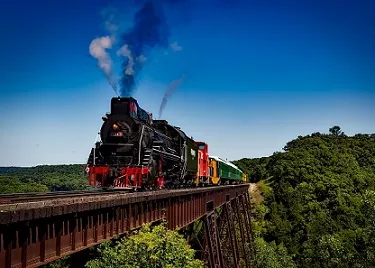
1) How do most people travel long distances in your country?
I’d say that the car is the most popular form of transport for long journeys . My country is quite small so you can reach anywhere in a day and most places within a few hours. You are independent when you drive and you just put your luggage in the car without having to carry it anywhere.
A lot of people use the train , both for long distance pleasure trips and to commute to the cities for work. Our cities have a big problem with congestion and it costs a lot to park your car so it’s more sensible to use the rail network .
There are also shuttle flights between the major cities so a lot of businessmen use these. The only time I travel by plane within my own country is when I’m visiting relatives up in Scotland as it’s a long way away from where I live. A plane is the quickest and easiest way to get there.
2) Do you think that transport problems are worse in urban or rural areas?
That’s difficult to say because transport issues in cities are very different to those in the countryside.
The biggest problem in our cities is congestion . There are just too many vehicles and the traffic jams are terrible. There always seem to be roadworks going on which cause bottlenecks and make things even worse. What’s more, all the cars , lorries and buses sitting in the long traffic queues emit exhaust fumes which leads to air pollution , another major concern in urban areas.
In the countryside, on the other hand, the main issue is the lack of an adequate public transport system . If you live in a small village, you might not even have a bus service so it’s impossible to get around unless you have your own private transport .
There used to be an extensive rail network serving small communities but in the 1960s, hundreds of lines were closed. Now you can only get to the main towns by train .
To weigh it up, I’d say that transport problems are equally serious in both urban and rural areas. There are just different issues.
3) Are too many people dependent on cars as a means of transport in your country?
In my opinion, most people rely on their car far too much. Many are too lazy to walk places or to commute by bike and they can’t be bothered to take the bus .
Most areas have a real problem with rush hour traffic . Although this is always blamed on people driving to work, it is far less busy on the roads during the school holidays, which suggests that the real issue is parents taking their kids to school in the car . I think that many more should make the journey on foot . This would be better for the children’s fitness as well as cutting down on congestion .
Not all the parents are being lazy. Lots just don’t have time to walk as they are rushing off to work but they could at least set up carpools as this would help to reduce the heavy traffic in the mornings.
If we had better weather in my country then I think that more people would commute by bike and you certainly see more people cycling to work in the summer.
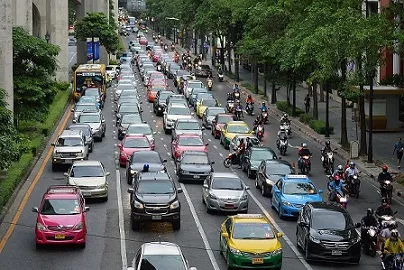
Click this link to get a PDF download of these practise questions & sample answers.
Download PDF Now
* Important
- Do not try and learn this list of transportation vocabulary.
- Identify the vocabulary you find useful for answering practise questions about this topic.
- Record these in your vocabulary notebook and practise using them regularly.
I recommend that you create your own answers to the transportation questions on this page. You will find many other IELTS-style practise questions by searching online.
For help on how to learn vocabulary, what to learn and how to record it, visit these pages:
How to Learn Vocabulary for IELTS
Top 6 Types of IELTS Vocabulary & Topic Word Lists
Transportation Vocabulary – Common Words & Phrases
Transportation Vocabulary Set 1: Key definitions
vehicle – a machine, usually with wheels and an engine, used for taking people or goods from one place to another, especially on roads
- Three vehicles were involved in the accidents near my house.
to transport – take or carry people or goods from one place to another using a vehicle
- Their furniture was transported to their new house in a large lorry.
transportation – a vehicle or system of vehicles, such as buses, trains, etc. for getting from one place to another
- What form of transportation are you going to use to get to the airport?
a means / form of transportation – any vehicle that you can travel in or on or use to carry goods in
- Bicycles are a cheap means of transportation and also keep you fit.
transport system – a facility consisting of the means and equipment necessary for the movement of passengers or goods
- The transport system in my country needs a lot of improvement.
public transport – a system of vehicles such as buses and trains that operate at regular times on fixed routes, charge set fares and are used by the public
- It’s much cheaper to use public transport in the city than drive a car.
private transport – means of transport that are not available for use by the general public such as your own car
- Most people prefer to use private transport to public transport as it makes them more independent.
traffic – the vehicles, pedestrians, ships, or planes moving along a route
- There was a lot of traffic on the roads this morning.
infrastructure – the basic systems and services, such as transportation and power supplies, that a country or organization uses in order to work effectively
- The earthquake caused serious damage to the area’s transport infrastructure .
a journey – the act of travelling from one place to another, especially in a vehicle
- The train journey took them through beautiful countryside.
Transportation Vocabulary Pronunciation
Transportation Vocabulary Set 2: Means of transport
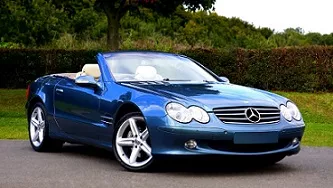
Transportation Vocabulary Pronunciation
Transportation Vocabulary Set 3: Roads & traffic
road – a long, hard surface built for vehicles to travel along
- Shakira waved to her mum as the bus drove off down the road .
lane – a division of a road marked off with painted lines and intended to separate single lines of traffic; a narrow rural road
- I find it quite scary driving in the fast lane of the motorway.
cycle lane – part of a road marked off with painted lines, for use by cyclists
- There have been far fewer cyclists killed on the roads since the government introduced cycle lanes in our towns and cities.
bus lane – part of a road marked off with painted lines, for use by buses
- Car drivers are not allowed to use the bus lanes .
bypass / ring road / beltway – a road which circles a town or city and enables you to go faster from one point to another.
- I usually take the ring road to visit my brother as the roads through town are always congested.
freeway / highway / expressway – a public road, often with multiple lanes, especially an important road that joins cities or towns together
- The traffic in the city centre moved slowly but once Raul hit the freeway there was less traffic and he was able to drive much faster.
motorway (UK) – a road with three lanes going each way
- Motorways are vitally important for the transportation of goods around the UK.
overpass – a bridge that carries one road over another road
- No-one believed that the new overpass would really ease traffic congestion but it has made a noticeable difference.
junction – where two roads meet
- Aksel only just missed the car that pulled out in front of him at the junction .
roundabout – a road junction at which traffic moves in one direction around a central island to reach one of the roads converging on it
- The traffic flowed much better when they replaced the traffic lights with a roundabout .
traffic light – a set of automatically operated red, amber and green lights for controlling traffic at road junctions and pedestrian crossings
- I have to drive through ten sets of traffic lights on the way to work and if I’m late, you can be sure they’ll all stop on red.
traffic jam – a line of vehicles moving very slowly or not at all
- The traffic jam was caused by roadworks near the shopping centre.
Collocations:
- to be caught in traffic / a traffic jam
- Mayuree missed her train after getting caught in traffic on the way to the station.
- t o get stuck in traffic / a traffic jam
- I nearly always get stuck in a traffic jam on my way to work.
heavy traffic – a lot of vehicles on the road
- A sunny weekend is forecast so there will be heavy traffic on the roads as people head to the coast.
to be congested – when a road or place is so crowded with traffic or people as to hinder or prevent freedom of movement
- The roads are particularly congested during the rush hour.
congestion – the state of being congested
- Congestion is a serious problem in most cities across the world.
queue – a line of people or vehicles waiting for something
- There were so many people heading into town for the sales that I had to queue for the car park.
roadworks – building or repair work on a road
- The roadworks were causing long delays for people travelling to work.
diversion – a different route used because a road is closed
- The accident closed the road and traffic had to take a two-mile diversion to get into town.
to be held up – to be stopped and delayed because of work on the road, diversions or accidents
- Soo-min apologised for being late and explained that she’d been held up in traffic.
bottleneck – a place where a road becomes narrow or a place where there is often a lot of traffic, causing the traffic to slow down or stop
- The roadworks were causing a serious bottleneck on the main road into town.
speed limit – the fastest rate at which you are allowed to drive in a particular area
If you are caught exceeding the speed limit , you will have to pay a fine.
speed camera – camera set up by a road to photograph cars exceeding the speed limit
- Most drivers slow down when they are approaching a speed camera .
road accident / car crash – a bad incident involving vehicles that happens unexpectedly and unintentionally, typically resulting in damage or injury
- Two people were taken to hospital following the car crash on the freeway.
Transportation Vocabulary Set 4: Travel
to commute – travel some distance between one's home and place of work on a regular basis
- When Talin got her new job, she moved closer to the city so that she wouldn’t have to commute too far each day.
to travel by – to use a particular mode of transport, e.g. bus, car, train, bike, etc, to get from one place to another
- To get to work, I travel by bus.
to take – to use a particular mode of public transport, e.g. bus, train, taxi, plane
- She didn’t want to wait for a bus in the pouring rain so took a taxi instead.
to get on – to get into a bus, train or plane
- They arrived at the station just in time to get on the train before it left.
to get off – to disembark from a bus, train or plane
- Shona pushed the bell as she wanted to get off the bus at the next stop.
bus route – the fixed, regular journey made by a bus
- One of the reasons I moved to my new address is because it’s on the main bus route into town.
bus service – a public facility whereby the general public can travel on a bus from one place to another along set routes for a fixed fee
- There is a good bus service into town from where I live.
timetable / schedule – a plan of the times when particular events are to take place
- Jared’s interview was at 9.30 a.m. and the timetable showed that the early train would get him there in plenty of time.
rush hour – the times at the beginning and end of the working day when many people are travelling to or from work
- Ogasi was so fed up with the rush hour traffic jams that he bought a bike to cycle to work.
carpool (US) / car share (UK) – an arrangement between people to make a regular journey together in a single vehicle, usually taking turns to drive
- If more people organized carpools , the roads wouldn’t be so congested.
park-and-ride – a system for reducing urban traffic congestion, in which drivers leave their cars in car parks on the outskirts of a town or city and travel into centre on public transport
- The park-and-ride scheme was so successful that a second one was set up on the other side of the city.
the outskirts – the areas that form the outer edge of a town, city or village, that are furthest away from the centre
- It’s great living on the outskirts . It’s easy to get into the city but we are also close to the countryside.
convenient – fitting in well with a person's needs, activities, and plans
- There’s a bus stop right outside my house which makes it very convenient for catching the bus to work.
independent – not influenced or controlled in any way by other people or events
- I’m so much more independent now that I have a scooter to get around.
overcrowded – full with too many people for it to be comfortable or safe
- The tube is so overcrowded in the rush hour that it’s impossible to get a seat.
unreliable – something or someone that is not trustworthy or efficient
- Our local bus service is very unreliable and is usually running late.
Transportation Vocabulary Set 5: Transport systems
network – a group or system of interconnected people or things
- The new government made a commitment to improving the country’s transport network .
Collocations :
- road network – a system of interconnected roads
- rail network – a system of interconnected railway lines
the underground / the tube / the subway / the metro – an underground railway system in a city
- The quickest way to get around London is on the underground .
canal – an artificial waterway constructed to allow the passage of boats or ships inland
- Ship canals such as the Panama Canal and Suez Canal are vitally important for world trade.
a shuttle – a vehicle or aircraft that travels regularly between two places
- Itsuki took the shuttle from his hotel out to the airport.
Transportation Vocabulary Set 6: Transportation & the environment
fuel – a substance that is used to provide heat or power, e.g. petrol, diesel, gasoline, oil,
usually by being burned
- Scientists are working hard to develop more environmentally friendly fuels .
emissions – an amount of something, especially a gas such as carbon dioxide, that is sent out into the air and harms the environment
- Car manufacturers are under pressure to reduce exhaust emissions .
emit – to produce and discharge something, especially a gas
- Vehicles emit high levels of harmful gases into the atmosphere.
exhaust fumes – harmful gases emitted from a vehicle engine
- Many cities have a big problem with air pollution caused by exhaust fumes .
energy efficient – using only a small amount of fuel
- I chose this make of car because it is very energy efficient .
air pollution – the presence of harmful substances in the air, often consisting of waste emissions from vehicles
- Air pollution is so bad in some cities that people have to wear face-masks when they go out.
environmentally-friendly – not harmful to the environment
- Electric cars are a more environmentally-friendly than those that run on petrol.
gas guzzler (informal) – a vehicle that uses a lot of fuel
- For many people, a large car is a status symbol and they aren’t concerned about the harm their gas guzzler is doing to the environment.
Transportation Vocabulary Set 7: The future
autonomous vehicle / driverless car / self-driving car – a car capable of driving itself through a computer system
- I would be very nervous of riding in an autonomous vehicle and don’t think that they are safe.
space travel – travel through outer space
- They say that it won’t be long before members of the public are able to enjoy space travel .
high-speed rail – a passenger train that travels at a very high speed using specialised rolling stock and a system of dedicated track
- In the future, high-speed rail networks will take over from traditional railways.
Transportation Vocabulary Set 8: Other vocabulary
to go on foot – to walk somewhere
- The restaurant was only a mile from our house and we decided to go on foot so that we could all enjoy a bottle of wine and no-one had to worry about driving home.
pedestrian – a person who travels on foot
- Some areas of our city are for pedestrians only and vehicles aren’t allowed there.
to run a car – to own and drive a car
- It’s not really worth running a car if you live in the city as it’s easier and cheaper to get around on public transport.
toll – money that you pay to use a particular road or bridge
- Some countries charge motorway tolls but most of our motorways are free to travel on.
a speeding fine – a sum of money that must be paid as punishment for driving faster than legally allowed
- I was really cross with myself for getting a speeding fine but it was my own fault for driving too fast.
Transportation Vocabulary Set 9: Idioms
bumper to bumper – very close together, as cars in a traffic jam
- The traffic is usually bumper to bumper when I take the kids to school.
beat the traffic – to leave early to avoid travelling when the roads are crowded
- Sharon left for the airport at 7.00 a.m. in order to beat the traffic .
hit the road – set out on a journey
- They hit the road early as they wanted to reach the holiday cottage by lunchtime.
hitch a lift / ride – to get a ride in someone else’s vehicle
If I miss the bus, I can usually hitch a lift with a colleague who lives a few streets away from me.
Click this link to get a PDF download of this list of transportation vocabulary.
Ways to Improve Your Transportation Vocabulary
One of the best ways to improve your transportation vocabulary is through reading. Watching topic related YouTube videos and listening to podcasts is also hugely beneficial.
Here are some online resources I recommend.
Intelligent Transport
IEEE Spectrum
Science Daily
I love TED Talks. They are short videos with a powerful message and are generally very interesting. They’re ideal for improving your vocabulary and give valuable listening skills practise.
Search TED Talks - Transportation to help you improve your transportation vocabulary.
All Topic Vocabulary
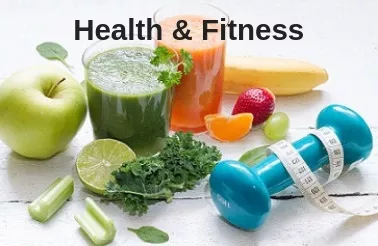
Would you prefer to share this page with others by linking to it?
- Click on the HTML link code below.
- Copy and paste it, adding a note of your own, into your blog, a Web page, forums, a blog comment, your Facebook account, or anywhere that someone would find this page valuable.
Like this page?
- IELTS Vocabulary
- Back To Top
* New * Grammar For IELTS Ebooks

$9.99 each Full Set Just $ 23.97
Find Out More >>
IELTS Courses

Full details...

Vocabulary Topic Packs
Learn vocabulary for common topics while getting valuable practice answering the different types of IELTS questions.
Just $5 each
Find out more >>
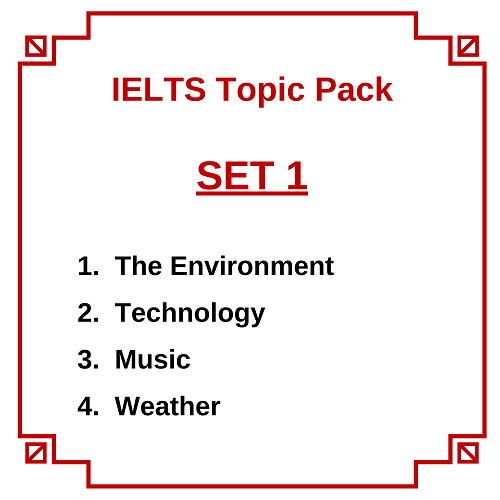
Testimonials
“I am very excited to have found such fabulous and detailed content. I commend your good work.” Jose M.
“Thanks for the amazing videos. These are ‘to the point’, short videos, beautifully explained with practical examples." Adari J.
"Hi Jacky, I bought a listening book from you this morning. You know what? I’m 100% satisfied. It’s super helpful. If I’d had the chance to read this book 7 years ago, my job would be very different now." Loi H.
"Hi Jacky, I recently got my IELTS results and I was pleased to discover that I got an 8.5 score. I'm firmly convinced your website and your videos played a strategic role in my preparation. I was able to improve my writing skills thanks to the effective method you provide. I also only relied on your tips regarding the reading section and I was able to get a 9! Thank you very much." Giano
“After listening to your videos, I knew I had to ditch every other IELTS tutor I'd been listening to. Your explanations are clear and easy to understand. Anyways, I took the test a few weeks ago and my result came back: Speaking 7, listening 9, Reading 8.5 and Writing 7 with an average band score of 8. Thanks, IELTS Jacky." Laide Z.
Contact
About Me
Site Map
Privacy Policy
Disclaimer
IELTS changes lives.
Let's work together so it changes yours too.
Copyright © 2024 IELT Jacky
All Right Reserved
IELTS is a registered trademark of the University of Cambridge, the British Council, and IDP Education Australia. This site and its owners are not affiliated, approved or endorsed by the University of Cambridge ESOL, the British Council, and IDP Education Australia.


Reading Actual Tests
Download PDF ielts reading test
Listening Recent Tests
Download PDF ielts listening test
english-practice.net
Practice English Exercises to Improve Your Skills
english-exercises.net
Practice More English Exercises to Improve Your Skills
englishpracticetest.net
Practice More English Tests to Improve Your Skills
Cambridge Practice Test
Practice Cam Listening Test with Answer & Transcript
Listening Practice Test
Practice Listening Test with Answer & Transcript
Practice Cambridge Reading Test with Answer
Practice Reading Test
Practice Reading Test with Answer
Practice Reading Mock Test with Answer
Speaking Practice Test
Speaking Practice Test with with Band 8-9 Samples
42 Common Topics for ielts Speaking Part 1
100 TOPICS for ielts Speaking Part 2 with Band 8 Sample
70 TOPICS for ielts Speaking Part 2 with Band 8+ Sample Recordings
Vocabulary Words
Most Common Vocabulary Topics for ielts Speaking
Writing Practice Test
Writing Practice Test with Band 8-9 Samples
Writing Mock Test with Band 8-9 Samples
Writing Task 2 Topics with Band 7-8-9 Samples
General Reading Tests
Practice General Reading Test with Answer
Vocabulary for IELTS Speaking – Topic: Travel and Holiday
ielts speaking topics
Vocabulary
accommodation : a room or building in which you stay during holidays or live. |e.g: While I’m travelling, my favourive types of accomodation are hotels.
all holiday : a time after you lost your job. He lost his job yesterday. |e.g: Now it’s all holiday for him.
all-inclusive : a hotel deal where the price includes accommodation, meals and drinks at any time. |e.g: I’ve never thought that hotels with all-incusive service are so comfortable! You can grab a piece of cake at 6 a.m. or get a cocktail at midnight .
half-board : if you request ‘half-board’ at a hotel, breakfast and dinner would be included in the hotel price (as part of the package). |e.g: John and Lily liked their tour with half-board service. They spent breakfasts and dinners in the hotel and bought lunches in the nearby cafes.
full-board : if you request ‘full-board’ at a hotel, that would include all three meals (breakfast, lunch and dinner) in the price of your accommodation.
self-catering : a holiday deal where meals are not provided. |e.g: Mary thinks that self-catering is neither pleasant nor efficient.
to book (something) : to arrange and confirm a place on a flight, a room in a hotel or a ticket for an event in the future. |e.g: If you book your plane tickets in advance, they will be much cheaper.
breathtaking view : an amazing view. |e.g: I’ve seen many breathtaking views during my journey to Paris.
busman’s holiday : when you spend your free time similarly to the time when you work. This expression comes from the idea that a bus driver would spend his holiday traveling somewhere on a bus. |e.g: Unfortunately, many people spend a busman’s holiday nowadays.
charter flight : a cheap regular flight. |e.g: Due to our modest budget, we had to take a charter-flight
check-in desk : the place at the airport where you register for your flight and deposit your luggage.
far-off destination : a distant place. |e.g: Australia is a far-off destination, nonetheless I want to visit it.
getting away from it all : escaping in order to rest from a daily routine. |e.g: After I passed my exams, I wanted to get away from it all for at least a couple of days.
go off the beaten track : to visit an uncommon place. |e.g: Unlike my brother, I prefer to go off the beaten track.
guided tour : a tour in which a group of people is guided by an expert. |e.g: Guided tours are a great way to learn about different places of interest.
head for : go in a direction for. |e.g: I’m heading for France for my next holidays.
holiday brochure : a publication with details of holiday. |e.g: Our guide gave us a great brochure about our hotel.
holiday destination : where you go for a holiday. |e.g: We chose New York as our holiday destination for the next summer.
holiday of a lifetime : a very special holiday, once in a lifetime. |e.g: Last year me and my family had a holiday of a lifetime in Italy.
holiday resort (tourist resort) : a place where lots of people go for a holiday. |e.g: Last year my family went on a journey to London. We lived in a great tourist resort.
hordes of tourists : crowds of tourists. |e.g: Hordes of tourist can be seen during summer near the city park.
in the middle of nowhere : in a place that is far away from where most people live. |e.g: My grand-mother lives in the middle of nowhere, but she loves her old little village.
local crafts : thighs made in the region. |e.g: My sister bought some amazing local crafts on her trip to India.
out of season : not within the main holiday period. |e.g: I decided to go on a journey with my friends out of season.
passport control : a place where you get your passport checked. |e.g: I spent a few hours waiting in line on a passport control.
package tour : a holiday at a fixed price in which the travel company arranges your travel, hotels, and sometimes meals for you |e.g: We bought a cheap package tour to Italy and stayed in a big hotel by the sea.
picturesque village : a nice, beautiful village. |e.g: My grandparents live in a picturesque village.
places of interest : memorable and honorable places. |e.g: My native city has a variety of places of interest.
short break : a little holiday. |e.g: My father had a short break this year, I hope he’ll be able to relax some more.
stunning landscape : a beautiful countryside. |e.g: Stunning landscapes are only one of many reasons why I want to visit Africa.
to go sightseeing : to go visiting sights of interest. |e.g: Today we went sightseeing with my friends.
to travel on foot / horse | e.g: When I’m in a small town I prefer to travel on foot.
to travel by bus / plane / car / bicycle / motorcycle |e.g: Although I usually travel by car, when I decided to visit Paris I had to travel by plane.
tourist attractions : places which tourists tend to visit. |e.g: Despite not being a tourist attraction, new fountain is very popular among the locals.
tourist trap : place with many tourists. | e.g: We’ve visited many tourists traps lately.
travel agency : a shop that specializes in booking holidays. |e.g: I’ve bought tickets for my trip through a travel agency.
wildlife safari : an observational holiday, mainly in Africa. |e.g: I’d love to go on a wildlife safari sometime.
youth hostel : a cheap hotel. |e.g: During our trip we stayed in a hostel, because we didn’t have enough money for a hotel.
IELTS Speaking sample about Travel & Holidays
Do you like travelling?
Yes, definitely! I think seeing the world, from great historical monuments to white sandy beaches, is what life is all about . It’s a very interesting way to learn about new cultures and explore new places.
What is your favourite type of holiday?
I really like going to the countryside, getting away from it all . Nothing relaxes me as much as wilderness… I am tired of tourist traps and usually go off the beaten track … What do you do on holidays?
I prefer visiting various museums and places of interest . For instance , on my last vacation I was to Rome and I visited 12 museums. It was fantastic! Of course, sometimes I go shopping with my friends or relatives too… But I don’t find it near as exciting…
Are there many tourists visiting your country?
Probably yes … My country has different tourist attractions in many cities, especially the capital… For example , my country has old-time religious traditions… That’s why we have a lot of ancient cathedrals and churches that are interesting for both tourists and local citizens…
Now, have a look at the card and prepare a monologue.
Describe a tourist attraction you once visited . You should say: – When you visited it – Where is it situated – Who you went with and say what about it you like the most
A couple of years ago I went on a holiday to Paris with my parents… it is a very popular tourist destination , since it has various places of interest , such as ancient museums and monuments… That’s why there are always hordes of tourists … So we decided to go out of season in the autumn… Fortunately , the weather was great, and we did not waste any days watching TV at the hotel… it was a memorable holiday … we enjoyed breathtaking views from the top of the Eiffel tower and dined in cozy little restaurants. I would certainly recommend visiting Paris, it is a picturesque city.
Why do you think tourism is so developed now?
Well, because it is a lot easier to travel nowadays… you can choose charter flights and find various youth hostels all around the world, so you don’t need to spend much money on the travelling. Moreover, you can book a trip via the Internet, so you don’t even have to leave home.
How people choose their destination?
There are a lot of ways. For instance, you can surf the internet for all the necessary information… Or you can visit different travel agencies for more advice.
What kind of transport do you prefer on holidays? Why?
It depends… I usually reach my holiday destination by plane because it is the fastest and the least dangerous way to travel. However , flying can be a bit uncomfortable… So I also travel by train from time to time … But I never drive car on a vacation, because I do it every day when I work… I would have a busman’s holiday otherwise.
Do you prefer travelling alone or in tour groups? Why?
I definitely prefer travelling alone because I like to plan the trip by myself… When choosing a guided tour , you should always conform to a set schedule… So if you are in India and, say , you want to spend an extra hour at Taj Mahal, you simply cannot do that with a group tour… I like independent travel. That way I get to see and do exactly what I want and spend as much time as I want at various stops.
Topic: Advertising
Topic: friends, submit a comment cancel reply.
Your email address will not be published. Required fields are marked *
Save my name, email, and website in this browser for the next time I comment.
Download ebooks
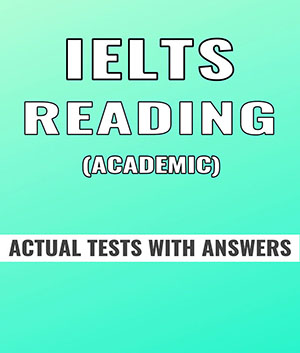
Welcome Guest!
- IELTS Listening
- IELTS Reading
- IELTS Writing
- IELTS Writing Task 1
- IELTS Writing Task 2
- IELTS Speaking
- IELTS Speaking Part 1
- IELTS Speaking Part 2
- IELTS Speaking Part 3
- IELTS Practice Tests
- IELTS Listening Practice Tests
- IELTS Reading Practice Tests
- IELTS Writing Practice Tests
- IELTS Speaking Practice Tests
- All Courses
- IELTS Online Classes
- OET Online Classes
- PTE Online Classes
- CELPIP Online Classes
- Free Live Classes
- Australia PR
- Germany Job Seeker Visa
- Austria Job Seeker Visa
- Sweden Job Seeker Visa
- Study Abroad
- Student Testimonials
- Our Trainers
- IELTS Webinar
- Immigration Webinar
Describe a journey that you remember well – IELTS Cue Card
Updated On Dec 11, 2023

Share on Whatsapp
Share on Email
Share on Linkedin

Guide to Achieving Band 8+ on IELTS Speaking Cue Cards
In IELTS Speaking, you should focus on one idea only and then expand that idea into a long meaningful sentence using grammar patterns and vocabulary. So, try practising this topic for Part 2 of the cue card for your IELTS Speaking and achieve a good score!
Describe a journey that you remember well.
You should say:
- Where did you go?
- How did you travel?
- Why did you go on the journey?
Sample Answer 1
Last year, I had the pleasure of embarking on the most memorable trip of my life. It was a trip from Patiala to Shimla, which is a distance of around 160 miles by automobile. It was my first self-driving travel experience.
My friends called me a week before my 24th birthday to inquire about my plans. We decided to go to Shimla and celebrate my birthday there on the spur of the moment. After completing my driving lessons and acquiring my driver’s license, I advised doing the road trip in our car. So, I requested my father lend me his car.
I was accompanied by four of my closest friends. They were concerned since I had never driven in a steep area before. However, I assured them that the ride would be pleasant. We had no clue about the road conditions while planning the route, and it was made worse by leaving the highway for a time; anyhow, the following 10 kilometers or so were on some of the worst, never-ending roads. As a result, it took us around 4 hours to get to the Shimla hotel we had reserved. Regardless, contrary to my worries, driving on hills was not difficult, and this was the first lesson that gave me the confidence to drive on hills.
Overall, the journey was delightful. We all had a good time on vacation. Fortunately, because it was a holiday, the roads were mostly empty. However, it took a long time to get there since we stopped at numerous places for food and beverages. There was a lot of merriment there, and we weren’t in the mood to leave sooner.
Sample Answer 2
Journeys have always been an enjoyable part of my life. Every trip has taught me something fruitful, and I have become a better person at the end of every trip. Also, by planning and executing random trips, I have enhanced my observation skills to a great extent. The knowledge I have gathered through these trips is tough to accumulate through other means.
So, to tell you about a journey that is still immaculate in my conscious, it is the last travel that I arranged. So, all this while, I wanted to visit secluded and quaint places. However, my previous trip was to Ladakh – one of the dream places of almost every adventure lover.
Initially, I had decided to travel by cab as Ladakh is approximately 800 km from my place. But I changed this decision all because of one video on Instagram. While scrolling through this social media platform, I stumbled upon a video that showcased snow-laden mountains captured from an airplane’s window on the way to Ladakh. The mesmerizing beauty of those mountains compelled me to drop the idea of traveling by cab, and I booked plane tickets.
I am an adventure lover, and Ladakh is one of the prettiest places on the earth. I visited there for its scenic beauty, to try delectable cuisines, relish colorful local festivals, explore gompas and monasteries, and rejuvenate and relax.
Sample Answer 3
Journeys, after all, are always unforgettable. It exposes us to new experiences and allows us to unwind ourselves. I like traveling because it allows me to explore new places and experience new things around the world. However, there are certain travels on which I have had less than good encounters. I would like to discuss one such journey.
I went on a road trip with my friends around three months ago. It was my first extended road trip with my friends, and it was the most unforgettable event of my life. Because my friends and I don’t get to see each other very frequently due to our busy job schedules, we decided to take a long road journey from Punjab to Rajasthan. Ten of our friends decided to come along, so we managed two cars accordingly.
Everyone was requested to arrive at a mutually agreed-upon location on the scheduled day of the voyage. However, due to tremendous traffic congestion that none of us had expected, everyone was an hour late. Thus, our adventure began after considerable hardship. Nevertheless, because of the nature of the trip, it was a joyful and exhilarating experience for me. For a few hours, everything was working well, and everyone was having a great time. We were enjoying our little giggles, and the sight of the road flanked by trees. There was relaxing music playing in the background, and we were enjoying our fullest.
Suddenly, our journey was interrupted by accident. The first car in the lineup came to a complete stop because a youngster was crossing the road in a hurry, and the rest of the cars crashed because they couldn’t control their speed. Everyone was upset and anxious for a few hours. After that, everyone felt sad and worried. After that, the thrill of the trip vanished, and towards the end of the journey, we just hoped to reach our destination safely.
[do_widget id=custom_html-22]
- Unwind (verb) – relax after a period of work or tension. Eg : Music is a good way to unwind.
- Encounter (verb) – unexpectedly be faced with or experience (something hostile or difficult). Eg : I have had a brief encounter with a wild dog.
- Tremendous (adj) – very great in amount, scale, or intensity. Eg : We witnessed tremendous change in our country.
- Exhilarating (adj) – making one feel very happy, animated, or elated; thrilling. Eg : An exhilarating workout is a great way to start the day.
- Interrupted (adj) – changing direction abruptly Eg : The meeting was interrupted by a knock on the door.
Explore More Recall Cue cards >>
Related Cue Cards
- Describe a new year celebration that you still remember
- Describe something you remember from your school or college days
- describe a rainy day you can remember/
- Describe A Teacher From Your Past That You Remember

30 + Difficult IELTS Cue Card Topics with Answer pdf
Janice Thompson
Soon after graduating with a Master’s in Literature from Southern Arkansas University, she joined an institute as an English language trainer. She has had innumerous student interactions and has produced a couple of research papers on English language teaching. She soon found that non-native speakers struggled to meet the English language requirements set by foreign universities. It was when she decided to jump ship into IELTS training. From then on, she has been mentoring IELTS aspirants. She joined IELTSMaterial about a year ago, and her contributions have been exceptional. Her essay ideas and vocabulary have taken many students to a band 9.
Post your Comments
Recent articles.
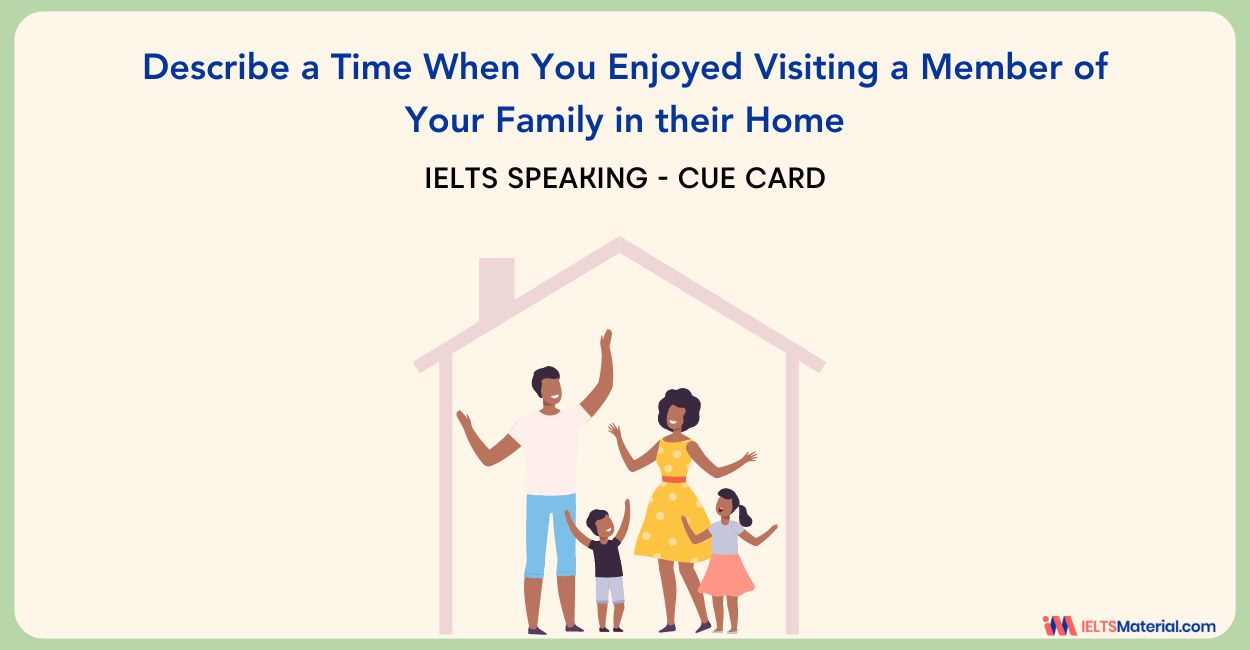
Nehasri Ravishenbagam

Our Offices
Gurgaon city scape, gurgaon bptp.
Step 1 of 3
Great going .
Get a free session from trainer
Have you taken test before?
Please select any option
Get free eBook to excel in test
Please enter Email ID
Get support from an Band 9 trainer
Please enter phone number
Already Registered?
Select a date
Please select a date
Select a time (IST Time Zone)
Please select a time
Mark Your Calendar: Free Session with Expert on
Which exam are you preparing?
Great Going!

25,000+ students realised their study abroad dream with us. Take the first step today
Meet top uk universities from the comfort of your home, here’s your new year gift, one app for all your, study abroad needs, start your journey, track your progress, grow with the community and so much more.

Verification Code
An OTP has been sent to your registered mobile no. Please verify

Thanks for your comment !
Our team will review it before it's shown to our readers.

- Study Abroad Test Prep /
IELTS Vocabulary for Travel: Words and Meaning

- Updated on
- Jun 23, 2023

To score well in the IELTS , one should be very good with vocabulary otherwise you will have limited words to answer a question. Repeated words make an answer dull and boring, the more words you know the better you will be able to answer. Learning proper vocabulary also means knowing how to use new terms in the right context.
This Blog Includes:
Importance of ielts travel vocabulary , ielts travel vocabulary with meaning, travelling synonyms for ielts , listening , writing , conversing .
Clearing the IELTS exam is dependent on how correctly you use your words. Here are some reasons why you should know the terms and words related to travelling.
- It is important to learn a wide range of vocabulary related to travelling to excel in the I ELTS Writing and Speaking sections so that you are able to express your thoughts and ideas on the topic.
- Travel is one of the most common topics in IELTS as many professionals, employees, and students are travelling due to work or for pleasure.
- Vocabulary related to travel can be used to describe interesting experiences and hobbies that you may want to share in response to some questions.
- Travel vocabulary is also important if you are planning for a vacation, it will help you to communicate well with the travel agents and tour guides.
There is a high probability that you will get a topic related to travelling in your IELTS writing or speaking section, and in that situation, Vocabulary can be a super weapon to make you shine in front of the examiners. Lets us refer to some of the Travel related vocabularies to make you stand out from the crowd.
In simple words, travelling means moving from one place to another for pleasure or work purposes. Synonyms help us t improve your content quality and assist us in communicating our ideas in a better way. Readers can take a look at the synonyms for Travelling mentioned below
- Peregrination
Must Read: Tips to Improve Your Vocabulary For Best PTE Score
Tips to Improve IELTS Vocabulary
It is essential to improve your vocabulary as it will help you to convey your thoughts, decisions, and ideas. Let’s see what are some ways that can help you to build your vocabulary
Spend some time reading. You may read your favourite genre of books or a magazine that interests you. You can also read newspapers and blogs available on the internet. This approach will help you learn new words and phrases that each writer uses.
Listening can also assist in polishing your vocabulary. Listen to different podcasts and shows. Note down the new terms that you heard and try to understand the meaning as well as the context. Paying attention to the words in audio will not only enhance your listening skills but also improve your pronunciation and vocabulary.
The best way to remember the words you learn is to note down the new terms in a notepad along with the meaning. Revise those words daily and try to use them while conversing with others.
Conversing is an effective method for learning new words. When you converse you get to know different words from the other person and understand their meaning as well as the context. It familiarises you with terms that you might haven’t heard before or didn’t understand where to use.
Ideally, daily one hour is enough to do activities for improving IELTS vocabulary and getting a good score band.
Reading Newspapers is an effective way to improve our vocabulary. Read the news and note down the new terms that you come across. Find their meaning, understand the context, and use them in your daily conversation to get familiarised with these terms.
Yes, Word games, crosswords, and puzzles are fun ways to improve vocabulary and cognitive abilities.
Hope the information provided above in the blog is useful for the readers. Vocabulary skills can’t be improved overnight, it’s a gradual process. Have patience and revise the terms you are learning daily.
If you are aiming to appear for IELTS 2023, Then follow Leverage Edu ‘s Leverage Live classes and our top trainers and strengthen your English score as well as your application so that you can secure your spot in your dream college. Fulfil your dreams of studying abroad with Leverage Edu, to get a free counselling session, reach us at 1800527130. Don’t forget to follow us on Facebook , Instagram , LinkedIn , and Twitter.
Alivia a budding journalist and content writer with 2 years of experience in SEO-focused content related to education.
Leave a Reply Cancel reply
Save my name, email, and website in this browser for the next time I comment.
Contact no. *

Connect With Us
25,000+ students realised their study abroad dream with us. take the first step today..

Resend OTP in

Need help with?
Study abroad.
UK, Canada, US & More
IELTS, GRE, GMAT & More
Scholarship, Loans & Forex
Country Preference
New Zealand
Which English test are you planning to take?
Which academic test are you planning to take.
Not Sure yet
When are you planning to take the exam?
Already booked my exam slot
Within 2 Months
Want to learn about the test
Which Degree do you wish to pursue?
When do you want to start studying abroad.
January 2024
September 2024
What is your budget to study abroad?

How would you describe this article ?
Please rate this article
We would like to hear more.
Have something on your mind?

Make your study abroad dream a reality in January 2022 with
India's Biggest Virtual University Fair

Essex Direct Admission Day
Why attend .

Don't Miss Out
IELTS Speaking Vocabulary

When it comes to using IELTS vocabulary , the Speaking section deserves special attention. To begin with, IELTS Speaking vocabulary is a huge part of your Speaking score. In fact, “lexical resource,” meaning variety and range of vocabulary, makes up 25% of your IELTS Speaking score. So you need to develop a good range of high-level vocabulary.
But there’s more to learning Speaking vocabulary than just memorizing words and definitions. Let’s explore what makes this section unique and challenging compared to other parts of the IELTS.
For more on how this section is scored, see the official IELTS Speaking band descriptors PDF .
IELTS Speaking Vocabulary: A Little Academic, A Little Conversational
In IELTS Speaking Part 1 and IELTS Speaking Part 3 , you need to actually use vocabulary in a live, ongoing conversation. You can’t pause to think of the right word, the way that you would in IELTS Writing. You are expected to respond immediately to vocabulary words you hear. You have little time to pause and think about what you’ve heard. This means you’ll need more than just passive listening or reading skills in conversational vocabulary.

Part 2 of IELTS Speaking is even more of a special case. This is the IELTS Speaking “long turn.” Here, you need to give a speech—2 to 3 minutes long—where you express a personal opinion about a social issue. This is similar to the kind of talk you might give in a university speech class. So you’ll need to know the vocabulary of formal speech, rather than conversation… and you’ll need to know some good academic transition words.
IELTS Vocabulary for Speaking: Parts 1 and 3
In IELTS Speaking Part 1, you’ll have a fast-paced conversation about your personal experiences. In Part 3, you will again have an active, personal conversation. The difference is that in Part 3, you aren’t just giving basic facts about your personal life. In this final section of IELTS Speaking, you also reflect on your personal life. This means you state your opinions about personal experiences you’ve had, and describe how these experiences affected you.
The topics of discussion in IELTS Speaking Parts 1 and 3 vary, but there are several common topics. You can find example questions for these topics in Magoosh’s IELTS Speaking Topics PDF .
IELTS Vocabulary for Speaking: Part 2
IELTS Speaking Part 2 serves as a kind of “bridge” between Parts 1 and 3 of the IELTS interview. After giving basic personal facts in Part 1, Part 2 gives you a chance to reflect on your personal experiences in a longer speech.
The Part 1 and Part 3 vocabulary words are also potentially useful in IELTS Speaking Part 2. However, IELTS Speaking Part 2 requires you to use additional types of academic words. You’ll need your speech to be just a little bit more formal than usual.
Don’t worry—you don’t need to use the highly formal vocabulary you’d use in IELTS Writing. Your speech can still have a natural, informal tone, for the most part. But it is a good idea to use formal transition words.
Because you are talking “solo,” without any replies from your interviewer, strong transition words are important. They help your interviewer understand your ideas, even though he or she cannot stop you to ask for clarification or extra information. In our IELTS Vocabulary PDF, you can find a list of formal transition words for the Speaking long turn.
Additional IELTS Speaking Vocabulary Resources
Ready to work on your IELTS speaking vocabulary? Check out these resources to get started:
- The Complete Guide to IELTS Speaking , to learn everything you need to know about the Speaking section.
- High-Level Words for IELTS Speaking , for skills-building advice.
- Magoosh IELTS Vocabulary PDF , for a comprehensive IELTS vocabulary word list.
- Top Ten IELTS Speaking Tips . This is not specifically a vocabulary resource, but these strategies are a powerful tool to help you apply all of your Speaking skills, including vocabulary.
To continue your IELTS vocabulary journey in other sections, check out our free guides to IELTS Listening and Reading words , IELTS Writing Task 1 vocabulary , and IELTS Writing Task 2 vocabulary .

David is a Test Prep Expert for Magoosh TOEFL and IELTS. Additionally, he’s helped students with TOEIC, PET, FCE, BULATS, Eiken, SAT, ACT, GRE, and GMAT. David has a BS from the University of Wisconsin-Eau Claire and an MA from the University of Wisconsin-River Falls. His work at Magoosh has been cited in many scholarly articles , his Master’s Thesis is featured on the Reading with Pictures website, and he’s presented at the WITESOL (link to PDF) and NAFSA conferences. David has taught K-12 ESL in South Korea as well as undergraduate English and MBA-level business English at American universities. He has also trained English teachers in America, Italy, and Peru. Come join David and the Magoosh team on Youtube , Facebook , and Instagram , or connect with him via LinkedIn !
View all posts
More from Magoosh
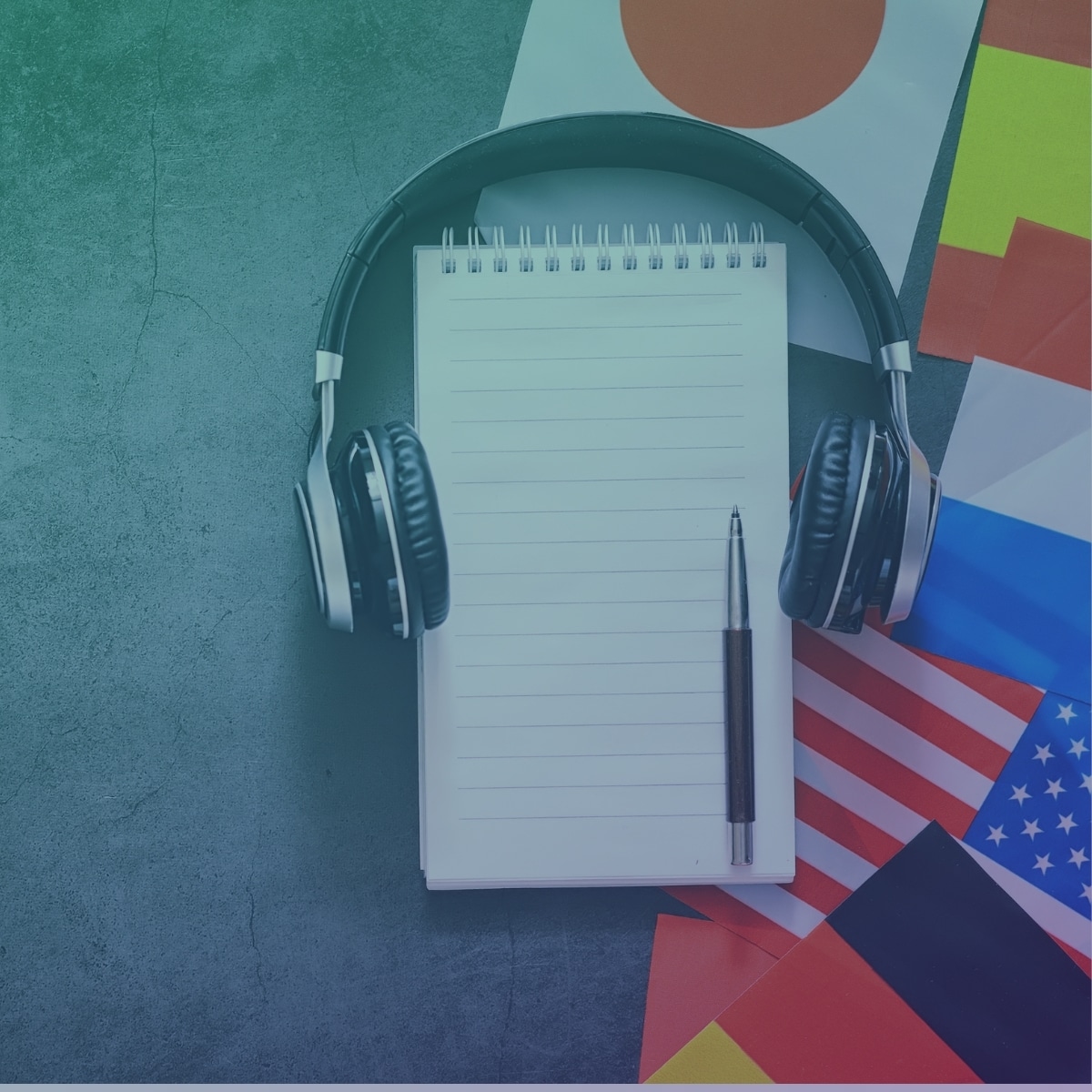
2 responses to “IELTS Speaking Vocabulary”
Thanks for sharing! I really appreciate your work 🙂
We’re so glad you like it! 🙂
Leave a Reply Cancel reply
Your email address will not be published. Required fields are marked *
IELTS Preparation with Liz: Free IELTS Tips and Lessons, 2024
- Test Information FAQ
- Band Scores
- IELTS Candidate Success Tips
- Computer IELTS: Pros & Cons
- How to Prepare
- Useful Links & Resources
- Recommended Books
- Writing Task 1
- Writing Task 2
- Speaking Part 1 Topics
- Speaking Part 2 Topics
- Speaking Part 3 Topics
- 100 Essay Questions
- On The Day Tips
- Top Results
- Advanced IELTS
Vocabulary for IELTS: Word Lists, Exercises & Pronunciation
IELTS vocabulary lessons with word lists, practice exercises and pronunciation. Learn word lists for common topics and how to pronounce words correctly in English. Vocabulary is 25% of your marks for IELTS writing and speaking and also plays a key role in listening and reading. You need to develop your English language vocabulary if you wish to crack IELTS.
Vocabulary for IELTS Topics
Below are IELTS topics for improving your English language vocabulary.
- Advertising
- Art: Paintings
- Body Language
- CORONAVIRUS
- Extra Practice
- Clothes: Casual and Formal
- Education: School & University
- Environmental Problems
- Food: Vegetables
- Government
- Musical Instruments
- People: Parts of the Face
- Plants: Speaking Part 1 Topic
- Urban Planning: Ideas, Vocab & Model Speaking Answers
Paraphrasing Successfully
Improve your IELTS vocabulary score by learn useful tips for paraphrasing in IELTS. You need to learn to paraphrase correctly and avoid errors to get a good score in all skills, particularly IELTS writing. Knowing which words to repeat and which words to paraphrase is essential.
Paraphrasing Video: How to paraphrase and avoid errors
Uncountable Nouns
Get a list of over 100 common uncountable nouns with practice exercises. This is an essential page to view before your IELTS test. The most common vocabulary mistake in IELTS is with uncountable nouns.
Common Uncountable Nouns List
Spelling: US vs UK English Words
Learn about the differences in spelling between UK English and US English. For the IELTS writing test, you ought to choose one type of spelling and not mix them. Click below:
UK & US Spelling Differences
Idioms count for your score of vocabulary. They are informal and should not be used in writing. But you can use some of them in IELTS speaking.
- Eat Your Greens Idiom: Video lesson
Individual Words for IELTS
Improve your vocabulary by learning the exact meaning of words and how to use them correctly. These lessons are either words lists or lessons which focus on how to use a particular word correctly. For students aiming to reduce the number of errors in their writing and speaking, these lessons are essential.
- Detrimental: Practice Lesson
- Lacking in / Lack of: Practice Lesson
- Academic Reading Vocabulary List 1
- Common / Popular Definition lesson
Vocabulary Lessons for IELTS Writing
- Line Graph Vocabulary
- Map Vocabulary and Useful Language: 1
- Practice with Linking Words for Essay Writing
Advanced IELTS Lessons & E-books

Click Below to Learn:
- IELTS Test Information
Copyright Notice
Copyright © Elizabeth Ferguson, 2014 – 2024
All rights reserved.
Privacy Policy & Disclaimer
- Click here: Privacy Policy
- Click here: Disclaimer
Return to top of page
Copyright © 2024 · Prose on Genesis Framework · WordPress · Log in
- A Beginner’s Guide to IELTS
- Common Grammar Mistakes [for IELTS Writing Candidates]
Writing Correction Service
- Free IELTS Resources
- Practice Speaking Test
Select Page
IELTS Topics: Transport
Posted by David S. Wills | Nov 30, 2019 | IELTS Tips | 0
There are many different topics that come up in the IELTS exam, and one of them is transport. This is not a main topic that would necessarily appear by itself, but rather one that would probably be mixed with other topics like society or technology .
Nonetheless, it is an important everyday issue and thus it is quite a common feature of the IELTS exam. It could be in a question you are asked for speaking, you might have to write an essay on it for writing, or you could find it mentioned in the listening or reading exams. Basically, it’s common and so it’s important.
I’m sure that anyone reading this article is able to say a few things about technology. You probably know the basic vocabulary – car, bus, train, airplane, and so on. But can you talk at length about them? Do you know some synonyms for these words or methods to talk about them? How about less common modes of transport? What about the prepositions that you should use when talking about modes of transport?
Today, I am going to teach you some vocabulary and grammar for the IELTS topic of transport, and then we will look at some sample questions and answers from the actual exam.
Transport Vocabulary
As I said before, you are probably familiar with many of the most important words of transport vocabulary that would be required for a good IELTS score. You wouldn’t need to know any particularly obscure words (although it might help you a little) such as the internal parts of an engine or the names of archaic forms of transport.
I have put together a short PPT that contains some transport vocabulary that might help you with your IELTS preparation. Obviously, I have not included “car” and “bus” because these are too easy. I have tried to include some more advanced words that might help you talk more accurately about the topic.
Grammar and Transport
Prepositions.
It is never enough just to know some words for IELTS. Words are only useful when you can join them with other words in order to make a full clause or sentence. As such, you should think about collocations – that means groups of words that naturally go together.
One thing that many English learns find tricky is the way that prepositions are used with transport. We use “in” or “on” but there appears to be no logical distinction between the two:
If you were to think of a rule, it seems that in many cases, when you are inside something, you can say “in” it – such as a car. However, there are also things that you are inside, like a train or plane, for which we say “on.” As such, there is no perfect rule to remember how to use these!
You can also see that there were some cases when “on” and “in” were both possible. We can say “in a boat” or “on a boat,” although there is a difference. If I am “in a boat” then it is a small boat, but if I am “on a boat” then it a big one. We are unlikely to say “in the subway” but it is possible. More commonly, “in the subway” means “in the subway system,” while “on the subway” means “on the subway train.”
There are other collocations, of course, that you can learn in your studies. One of them involves the word “crash.” A lot of people know this word but don’t know how to use it. Let’s look at some examples:
- I crashed my car last week.
- The bus crashed into a lamppost.
- There was a terrible plane crash.
As you can see, we use “crash” as a verb followed by a noun phrase when we don’t say what was crashed into. We can also follow the verb with “into” and then explain what the thing (which came before the verb) crashed into. Finally, we can use it as a noun.
I recently encountered an IELTS student using “crash” to refer to the dangers of children playing near roads. He said that cars might “crash into children.”
This is very logical, but actually it is not correct. When we talk about cars hitting people, we do not say “crash” because this refers to two big things (a car and a wall, for example). For hitting people, we might say something like the following:
- A young boy was run over (by a car) last weekend.
- You must be careful not to hit anyone while driving through a village.
- The old lady was run down by a speeding driver.
To be able to talk about transport, like anything else, you need to be able to use tenses accurately and to make sure that they match correctly with the subject of the sentence.
Look at the following and find out what is wrong with it:
These days, traffic in the cities can be very heavy, so bike is a good way to get to work or school.
In this case, actually the verb is correct but the noun is wrong. We should use the present simple and a plural subject: “bikes are a good way…” The reason for this is that when we state general facts or opinions, we should use this tense. We also use the plural form of the noun in most cases, although it is possible to pick one hypothetical example:
These days, traffic in the cities can be very heavy, so a bike is a good way to get to work or school.
When you are talking about your own experiences, you will probably use past tenses, but if it is an on-going part of your life you may use the present simple. For example, you might say something like:
When I was in school, I took the bus from outside my parents’ house, but later at university I lived on campus and so I walked . These days, I mostly cycle to work , but I hope to buy a car so that I can drive to work in future because it gets a bit too cold in winter.
Here, we began talking about the past, so we used past simple (took, walked). However, the discussion moved into the present, so the present tense was correct (cycle) and then when the future was appropriate, I used that (drive).
IELTS Speaking Questions about Transport
There are many possible questions that could occur in the IELTS speaking test related to the topic of transport. Let’s look at a few of them and I will write some sample answers for you, with highlighted words and phrases. The following three questions are from part one of the speaking test.
Q: How did you get here today?
A: I drove here from my home. It’s actually my parents’ car, but they lent it to me for the day.
Q: Do you ever use public transportation?
A: Yes, I sometimes take the bus or subway , but it depends where I’m going. I passed my driving test a few years ago so when I can borrow a car, I will drive, but otherwise I rely on public transport .
Q: Is there a lot of traffic congestion in your hometown?
A: No, it’s not too bad actually. In fact, there is almost never a traffic jam . The only problem we have is that sometimes cars go too fast through the quiet streets, which is dangerous considering that children often play by the roads.
IELTS Writing and the Topic of Transportation
The topic of transport could appear in either part of the IELTS writing test. For task one, it is possible that you would have questions about a line graph or bar chart showing different types of transport, or perhaps a map that includes roads. For task two, it’s probable that you will be asked to discuss an issue such as reducing pollution in cities.
Below, I will give you a sample answer for both a task one and task two question. Again, I will highlight some useful words and phrases.
Task 1 Question
The following bar chart shows the different modes of transport used to travel to and from work in one European city in 1960, 1980 and 2000.
Sample Answer
The bar chart compares modes of transportation for people commuting to work in a European city. It looks at data from a forty year period, beginning in 1960 and ending in 2000. There were significant changes during this time.
In 1960, the most popular means of getting to work was by walking, with nearly 35% of people choosing to go on foot . Similarly, a quarter of people chose to cycle to work. These methods were far more popular than taking a car, which only about 5% of people did.
These data saw a complete reversal over the next forty years, with walking and cycling falling in popularity, while driving skyrocketed to become the most common method of commuting . By 2000, the figures for these three methods had nearly inverted.
Buses, on the other hand, started and ended the period at around the same level, although they spiked in popularity in 1980, briefly being the chosen type of transport for about a quarter of people.
Task 2 Question
Some people think it is necessary to spend large sums of money on constructing new railway lines for very fast trains between cities. Others believe the money should be spent on improving existing public transport.
Discuss both these views and give your own opinion.
There is usually significant debate when it comes to very large sums of money being spent on infrastructure improvements . In recent years, it has become common for countries to invest in high-speed rail projects that connect the whole country, but this is often criticized when that money could have alternatively been spent upgrading existing transport systems . This essay will explore both perspectives, and decide that both ideas have merit.
High-speed rail is a great way of moving people around a country quickly and with comparatively little damage to the environment. As such, governments around the world are quick to invest in such schemes. The benefits are obvious: these trains can move large numbers of people across hundreds of miles in just a few hours, making them faster and more economical than cars . Although a plane is quicker, trains are more environmentally-friendly and involve less hassle than going to an airport .
However, high-speed rail is quite expensive, and when governments suggest building them, others often point out that there are already public transportation networks in the country that could be vastly improved with that same money. In small countries like the UK, existing railway lines could be upgraded to keep them running smoothly instead of building new ones. Moreover, the money could be spent on improving buses and trams, or repairing damage to roads to keep traffic flowing .
There is no easy answer to this debate, but it is clear that both investing in high-speed rail and investing in the existing infrastructure could potentially yield great benefits for a country.
About The Author
David S. Wills
David S. Wills is the author of Scientologist! William S. Burroughs and the 'Weird Cult' and the founder/editor of Beatdom literary journal. He lives and works in rural Cambodia and loves to travel. He has worked as an IELTS tutor since 2010, has completed both TEFL and CELTA courses, and has a certificate from Cambridge for Teaching Writing. David has worked in many different countries, and for several years designed a writing course for the University of Worcester. In 2018, he wrote the popular IELTS handbook, Grammar for IELTS Writing and he has since written two other books about IELTS. His other IELTS website is called IELTS Teaching.
Related Posts
Describe a Shop [IELTS Speaking]
July 13, 2020
IELTS Speaking: Best Friend
January 10, 2022
How to Write an Essay Outline [IELTS Writing]
June 6, 2022
Describe a Sportsperson you Admire
October 22, 2016
Leave a reply Cancel reply
Your email address will not be published. Required fields are marked *
This site uses Akismet to reduce spam. Learn how your comment data is processed .
Download my IELTS Books
Recent Posts
- How to Improve your IELTS Writing Score
- Past Simple vs Past Perfect
- Complex Sentences
- How to Score Band 9 [Video Lesson]
- Taxing Fast Food: Model IELTS Essay
Recent Comments
- Francisca on Adverb Clauses: A Comprehensive Guide
- Mariam on IELTS Writing Task 2: Two-Part Questions
- abdelhadi skini on Subordinating Conjunction vs Conjunctive Adverb
- David S. Wills on How to Describe Tables for IELTS Writing Task 1
- anonymous on How to Describe Tables for IELTS Writing Task 1
- Lesson Plans
- Model Essays
- TED Video Lessons
- Weekly Roundup
IELTS Mentor "IELTS Preparation & Sample Answer"
- Skip to content
- Jump to main navigation and login
Nav view search
- IELTS Sample
Cue Card Sample
Describe a journey that you remember well - cue card # 534, describe a journey [e.g. by car, plane, boat] that you remember well..
- where you went
- how you travelled
- why you went on that journey
More Ideas to talk about this Cue Card/ Candidate Task Card topic:
Topic: describe a journey that you remember well., part 3: details discussion.
- IELTS Cue Card
- Candidate Task Card
- Speaking Part 2
IELTS Materials
- IELTS Bar Graph
- IELTS Line Graph
- IELTS Table Chart
- IELTS Flow Chart
- IELTS Pie Chart
- IELTS Letter Writing
- IELTS Essay
- Academic Reading
Useful Links
- IELTS Secrets
- Band Score Calculator
- Exam Specific Tips
- Useful Websites
- IELTS Preparation Tips
- Academic Reading Tips
- Academic Writing Tips
- GT Writing Tips
- Listening Tips
- Speaking Tips
- IELTS Grammar Review
- IELTS Vocabulary
- IELTS Cue Cards
- IELTS Life Skills
- Letter Types

- Privacy Policy
- Cookie Policy
- Copyright Notice
- HTML Sitemap

IMAGES
VIDEO
COMMENTS
Useful Collocation and Expressions for IELTS Speaking - Topic:Travel. To get away : To escape, to go somewhere that is not your home. You can also use the noun "a getaway.". Example: Last week, I had a great chance to get away from the hustle and bustle of the city to visit an ancient village in the countryside.
1. Travel Vocabulary. Attraction - A place that entices visitors because it is interesting. Backpacking - To travel, often to more than one destination, with your belongings in a backpack. Camping - A holiday spent in a tent or camper van. Cruise - A sea-based trip taking a pre-planned route that involves visiting several ports.
To come up with (v) - to think of an idea, plan or solution. Safe and sound (adj)- usually used when we talk about the end of a trip. It means not hurt or damaged. To commute (v) - to make the same journey regularly between work and home. To set off (v) - to begin a journey. Arduous (adj) - involving or requiring strenuous effort; difficult and ...
IELTS Vocabulary to talk about Cities. add to (its) attraction: make it more attractive. thriving: lively and successful. hustle and bustle: full of movement and noise. a craze: an activity that suddenly becomes very popular. a (holiday) resort: a popular destination for holidays.
On this page you can find useful IELTS speaking vocabulary with sentence examples for Travel & Holidays topic. This vocabulary is very useful to answer questions about travel and holidays and achieve a high score on IELTS Speaking test. See IELTS Speaking sample about Travel & Holidays >. accommodation: a room or building in which you stay ...
Travel and Tourism Vocabulary for IELTS. This travel and tourism vocabulary for IELTS will help you with any speaking questions that may come up around this topic or essays related to it. You may know some of the words, but you can see examples of them in context which will help you know how to use them correctly.
Vocabulary sets related to travel & holidays. Now that we have looked at using the words 'travel' and 'holiday' in a variety of contexts, it's time to explore two relevant sub-topics that can also help you to talk or write about travel and holidays on your IELTS. Keep in mind that this common theme may come up in any of the three ...
07/24/2023. Below is a detailed list of vocabulary related to "Travel planning" suitable for IELTS band 6.5-8.0: Itinerary: Definition: A detailed plan or schedule of a journey, including dates, times, and activities. Destination: Definition: The place to which someone is traveling or where a journey is intended to end. Accommodation:
💥 Start your IELTS preparation for FREE: https://englishprotips.com/🔥 Full access to all my IELTS preparation courses: https://englishprotips.com/plans/20 ...
IELTS score between 1 and 9 for each part of the test - Listening, Reading, Writing and Speaking. You can score whole (e.g., 5.0, 6.0, 7.0) or half (e.g., 5.5, 6.5, 7.5) bands in each part. Universities often demand an IELTS score of 6 or 7. They may also demand a minimum IELTS score in each of the 4 sections. IELTS scoring system and band scale
Learning transportation vocabulary is great preparation for your exam as transport is a common IELTS topic. Find over 120 useful words & phrases, plus practise IELTS-style questions & answers with PDF downloads & other resources. All created to make your life easier.
IELTS Speaking Vocabulary-Travel. Here is a vocabulary list that I made a while ago for one of my students who was struggling to come up with interesting phrases related to travel that would help her reach band 8 for IELTS speaking. It was inspired by a Lonely Planet article and many of the phrases were taken directly from there.
Here's a list of useful vocabulary from last week's 'journey' description. First, some collocations: took a journey, made a journey a bad journey a peaceful trip, a quieter trip a half-empty train a prepaid ticket an available seat loud voices the station concourse football fans a big match find a seat noisy fans, excited fans, friendly fans, good-natured fans a comfortable seat And some nice ...
Vocabulary. accommodation: a room or building in which you stay during holidays or live. |e.g: While I'm travelling, my favourive types of accomodation are hotels. all holiday: a time after you lost your job.He lost his job yesterday. |e.g: Now it's all holiday for him. all-inclusive: a hotel deal where the price includes accommodation ...
Sample Answer 3. Journeys, after all, are always unforgettable. It exposes us to new experiences and allows us to unwind ourselves. I like traveling because it allows me to explore new places and experience new things around the world. However, there are certain travels on which I have had less than good encounters.
Travelling Synonyms for IELTS. In simple words, travelling means moving from one place to another for pleasure or work purposes. Synonyms help us t improve your content quality and assist us in communicating our ideas in a better way. Readers can take a look at the synonyms for Travelling mentioned below. Peregrination.
This vocabulary collection will help you learn terms related to food, art, entertainment and more. Brush up on this collection and navigate the reading, writing, speaking, and listening sections of the test with confidence. Science and Technology. Delving into words related to science and technology is a key strategy for success on the IELTS exam.
To continue your IELTS vocabulary journey in other sections, check out our free guides to IELTS Listening and Reading words, IELTS Writing Task 1 vocabulary, and IELTS Writing Task 2 vocabulary. Author. David Recine. David is a Test Prep Expert for Magoosh TOEFL and IELTS. Additionally, he's helped students with TOEIC, PET, FCE, BULATS, Eiken ...
To do this, you need to read or listen to something in English each day. If the material is challenging enough, you will encounter many new words, but try to just pick a few of them to learn. For each word, follow this approach: Try to guess its meaning from context. Check that meaning against a dictionary definition.
IELTS vocabulary lessons with word lists, practice exercises and pronunciation. Learn word lists for common topics and how to pronounce words correctly in English. Vocabulary is 25% of your marks for IELTS writing and speaking and also plays a key role in listening and reading. You need to develop your English language vocabulary if you wish to ...
IELTS Writing and the Topic of Transportation. The topic of transport could appear in either part of the IELTS writing test. For task one, it is possible that you would have questions about a line graph or bar chart showing different types of transport, or perhaps a map that includes roads. For task two, it's probable that you will be asked ...
Topic: Describe a journey that you remember well. 1. I will always remember the boat journey I made on the Ganges in India. The journey took us to another ghat (port) which is a few kilometres away from where we started. And some of my friends accompanied me on this trip. It was an aimless journey on a moonlit night.
Sample answer. Vocabulary (Answer) There are quite a few means of transport in Vietnam, but motorbikes are taking the lead. (Reason) People prefer to travel by motorbike because it is more economical and the most important thing is that when it comes to traffic congestion, it takes ages for car to move on the road but it is much easier for a motorbike to wend its way forward and escape the bad ...
What you'll learn. Explore over 5700 common and academic English words, continually expanding, designed for success in IELTS, TOEFL, SAT, PTE, and GRE exams. Decode vocabulary visually using 5700+ words & clear explanations. Excel in exams confidently. Master vocabulary visually with speaker-led explanations & engaging visuals.
Twelve years ago, Clark Dean was at rowing camp when he had an epiphany. If he set his mind to it, one day he could become an Olympian. The moment stood out for him, so much so that he choose the ...